DashClicks Blog
The industry's top experts offer their best advice, research, how-tos, and insights—all in the name of helping you level-up your business and online marketing skills.
Join Us!

How Agencies Upsell SEO Packages Without Overpromising
Upselling SEO services can make or break an agency's profitability. The difference between thriving agencies and those barely surviving often comes down to one crucial skill: knowing how to expand client relationships without making unrealistic promises that destroy trust.
Smart agencies understand that sustainable growth happens when you deliver consistent value while strategically introducing new services. This approach builds long-term partnerships rather than short-term revenue spikes followed by client churn.
The key lies in positioning SEO packages as natural progressions of existing success stories. When done correctly, upselling becomes a service to your clients—helping them achieve bigger goals they didn't know were possible. When done poorly, it becomes a reputation killer that haunts agencies for years.
This guide reveals proven strategies top-performing agencies use to increase average client value by 40-60% while maintaining stellar client satisfaction scores.
The Foundation: Understanding Client Success Metrics
Before attempting any upsell, successful agencies establish clear performance baselines. This means tracking not just rankings and traffic, but business-impact metrics that matter to decision-makers.
- Revenue Attribution: Connect SEO efforts directly to sales numbers. Agencies using tools like Google Analytics 4 and CRM integrations show clients exactly which organic keywords drive revenue. This foundation makes up-selling conversations about growth opportunities rather than service features.
- Competitive Intelligence: Document competitor movements and market opportunities. When clients see competitors gaining market share through expanded SEO strategies, upsells become strategic necessities rather than optional extras.
- Growth Trajectory Mapping: Present 6-12 month projections based on current performance trends. Agencies that visualize future opportunities create natural discussion points for expanded services.
Strategic Timing: When to Introduce New Services
Timing separates amateur upselling attempts from professional growth strategies. Elite agencies follow proven timing principles that maximize acceptance rates while preserving client relationships.
Performance Peak Moments
The optimal upselling window occurs during performance peaks—when clients are celebrating wins and feeling confident about their SEO investment. Research shows that upsell offers timed to coincide with positive milestones—such as consistent product usage or recent performance gains—can yield up to 3x higher acceptance rates compared to offers made without contextual triggers.
- Monthly Reporting Wins: Use reporting calls to highlight achievements, then immediately pivot to discussing expanded opportunities. "Your local SEO campaign generated 47 new leads this month. Here's how we can scale this success to three additional markets."
- Ranking Breakthroughs: When target keywords hit page one, clients are primed for expansion discussions. This momentum creates perfect conditions for introducing complementary services.
Contract Renewal Periods
Renewal negotiations provide natural opportunities for service expansion. Rather than simply extending existing agreements, forward-thinking agencies present enhanced packages that address evolving business needs.
- Annual Strategy Reviews: Position renewals as strategic planning sessions rather than contract discussions. Present market analysis, competitive insights, and growth opportunities discovered during the partnership.
- Performance Evolution: Show how business goals have expanded since the original contract. Most clients experience significant growth during successful SEO partnerships, creating a need for more comprehensive strategies.
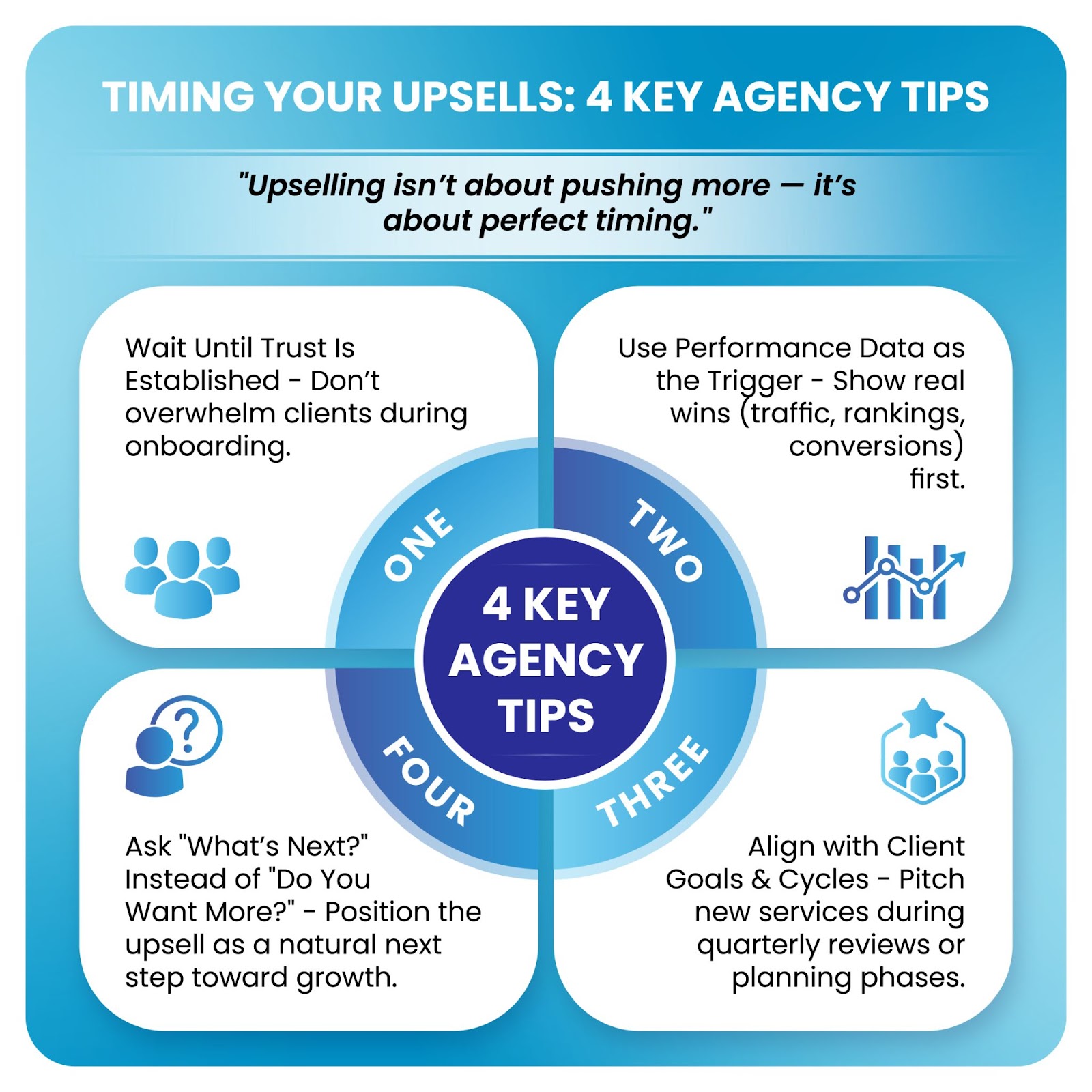
White Label SEO Reseller Programs: Scaling Without Overhead
Smart agencies leverage white label SEO reseller partnerships to offer comprehensive packages without massive internal expansion. This strategy allows smaller agencies to compete with enterprise-level service offerings while maintaining healthy profit margins.
Choosing the Right White Label SEO Company
Not all white label SEO reseller programs deliver equivalent value. Top-performing agencies evaluate partners based on specific criteria that ensure seamless client experiences.
- Transparency Standards: Premium white label SEO company provide detailed reporting that agencies can customize and present as their own work. Look for partners offering branded reports, customizable dashboards, and direct communication protocols.
- Service Depth: Comprehensive white label partnerships include technical SEO, content creation, link building, and local optimization. This breadth allows agencies to present unified strategies rather than piecemeal services.
- Quality Assurance: Evaluate potential partners through trial projects before committing to client work. The best white label SEO reseller program offers money-back guarantees and maintains strict quality standards.
Integration Strategies
Successfully integrating white label services requires careful planning and execution. Agencies must maintain brand consistency while leveraging external expertise.
- Seamless Client Communication: Establish clear communication protocols with white label partners. Clients should never feel disconnected from their primary agency contact, regardless of who performs the actual work.
- Quality Control Systems: Implement review processes for all white label deliverables before client presentation. This ensures consistency with agency standards and maintains reputation protection.
- Pricing Structure Optimization: Structure white label partnerships to maintain healthy margins while offering competitive client pricing. Most successful agencies target 40-50% gross margins on reseller services.
Package Structuring: Creating Irresistible Offers
Strategic package design transforms individual services into comprehensive solutions that clients find difficult to refuse. The most successful agencies follow proven psychological principles when structuring SEO upsells.
The Good-Better-Best Framework
This classic pricing psychology approach works exceptionally well for SEO services. Agencies using tiered approaches see 34% higher average order values compared to single-option presentations.
- Anchoring Effect: Present the premium package first to establish a high-value reference point. This makes mid-tier options appear more reasonable and valuable.
- Value Stacking: Each tier should include all services from lower levels plus meaningful additions. Avoid feature removal between tiers, which creates negative psychological associations.
- Clear Differentiation: Ensure each package level addresses distinctly different SEO goals. Good for maintenance, Better for growth, Best for market domination.
Service Bundling Psychology
Strategic bundling increases perceived value while simplifying decision-making for clients. Research shows that well-structured bundles can increase acceptance rates significantly.
- Complementary Services: Combine services that naturally support each other. Local SEO pairs perfectly with Google Business Profile optimization and review management.
- Outcome-Focused Naming: Use package names that describe results rather than services. "Market Domination Package" sounds more compelling than "Advanced SEO Bundle."
- Limited-Time Incentives: Create urgency through time-sensitive offers or bonus inclusions. "Add social media management this month and save 20% for the first six months."
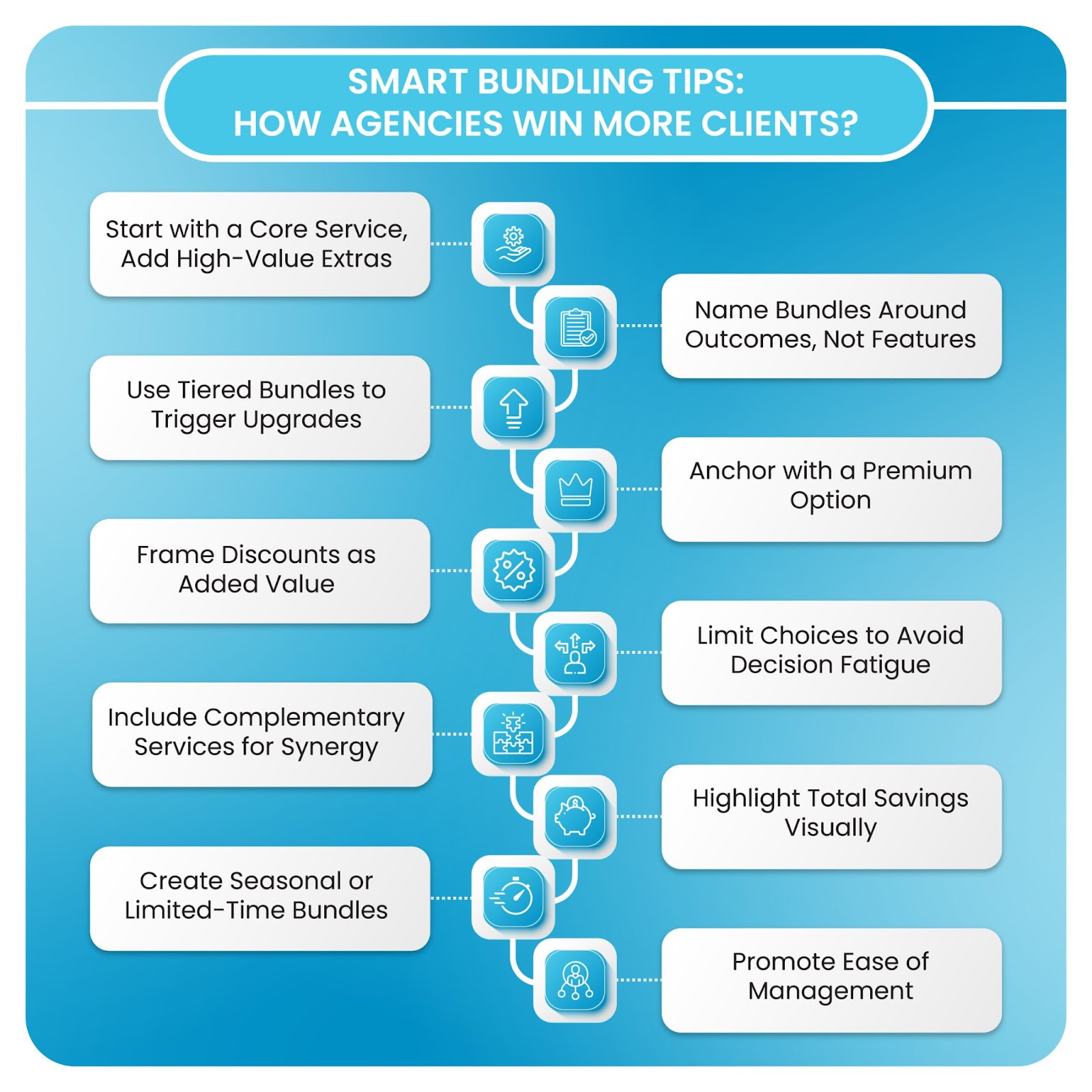
Communication Strategies That Build Trust
How you present upsell opportunities determines success rates more than the actual services offered. Master communicators focus on client benefits rather than agency needs.
Consultative Selling Approach
Position yourself as a strategic advisor rather than a service vendor. This approach builds trust and positions upsells as professional recommendations rather than sales pitches.
- Business Impact Focus: Every upsell conversation should start with business objectives, not SEO tactics. "Your goal is to expand into three new markets. Here's the SEO strategy that makes that possible."
- Data-Driven Recommendations: Use client performance data to justify expanded services. "Your content marketing ROI is 340% higher than industry average. Doubling our content investment could generate significant additional revenue."
- Competitive Intelligence: Share market insights that create urgency for expanded services. "Your main competitor just launched a comprehensive local SEO campaign. Here's how we stay ahead."
Objection Prevention
Anticipate common concerns and address them proactively during presentations. This prevents objections from derailing conversations and demonstrates thorough planning.
- Budget Constraints: Present flexible implementation timelines that respect budget limitations. "We can phase this implementation over six months to manage cash flow impact."
- Resource Concerns: Explain how expanded services actually reduce client workload rather than increase it. "This package includes content creation, so your team can focus on core business activities."
- ROI Uncertainty: Provide conservative projections based on similar client results. "Even with a modest 15% improvement, this investment pays for itself within four months."
- Client Follow-Up: Plan for continual follow-up to maximize results. "Once we have completed implementation, we will schedule periodic check-ins to ensure the new system is meeting your needs and make any necessary adjustments.
Performance Tracking and Reporting Excellence
Exceptional reporting transforms service delivery into powerful upselling opportunities. Clients who clearly understand their results become advocates for expanded services.
Advanced Analytics Integration
Modern SEO reporting goes far beyond rankings and traffic numbers. Sophisticated agencies connect SEO performance to business metrics that matter to executives and decision-makers.
- Revenue Attribution Models: Use multi-touch attribution to show how SEO contributes to sales throughout the customer journey. This data supports higher-value service packages by demonstrating clear ROI.
- Competitive Performance Benchmarks: Include competitor analysis in monthly reports to highlight opportunities and threats. This context creates natural discussions about expanded strategies.
- Predictive Performance Modeling: Show projected results from current trends and proposed service expansions. Visual projections make the value of upsells immediately apparent.
Client Education Through Reporting
Transform monthly reports into educational experiences that foster SEO literacy and cultivate an appreciation for strategic opportunities.
- Strategy Explanation: Include brief explanations of tactics and their expected outcomes. Educated clients become better partners and more receptive to strategic recommendations.
- Market Context: Provide industry insights and algorithm updates that affect strategy decisions. This positions your agency as a trusted advisor rather than just a service provider.
- Opportunity Identification: Highlight untapped opportunities discovered through ongoing optimization work. This creates natural segues into expanded service discussions.
One effective way to achieve this is by using the Pyramid Principle. This method suggests structuring your report with a clear and logical hierarchy of ideas, starting with the main point or conclusion, followed by supporting evidence and arguments, and ending with details and examples.
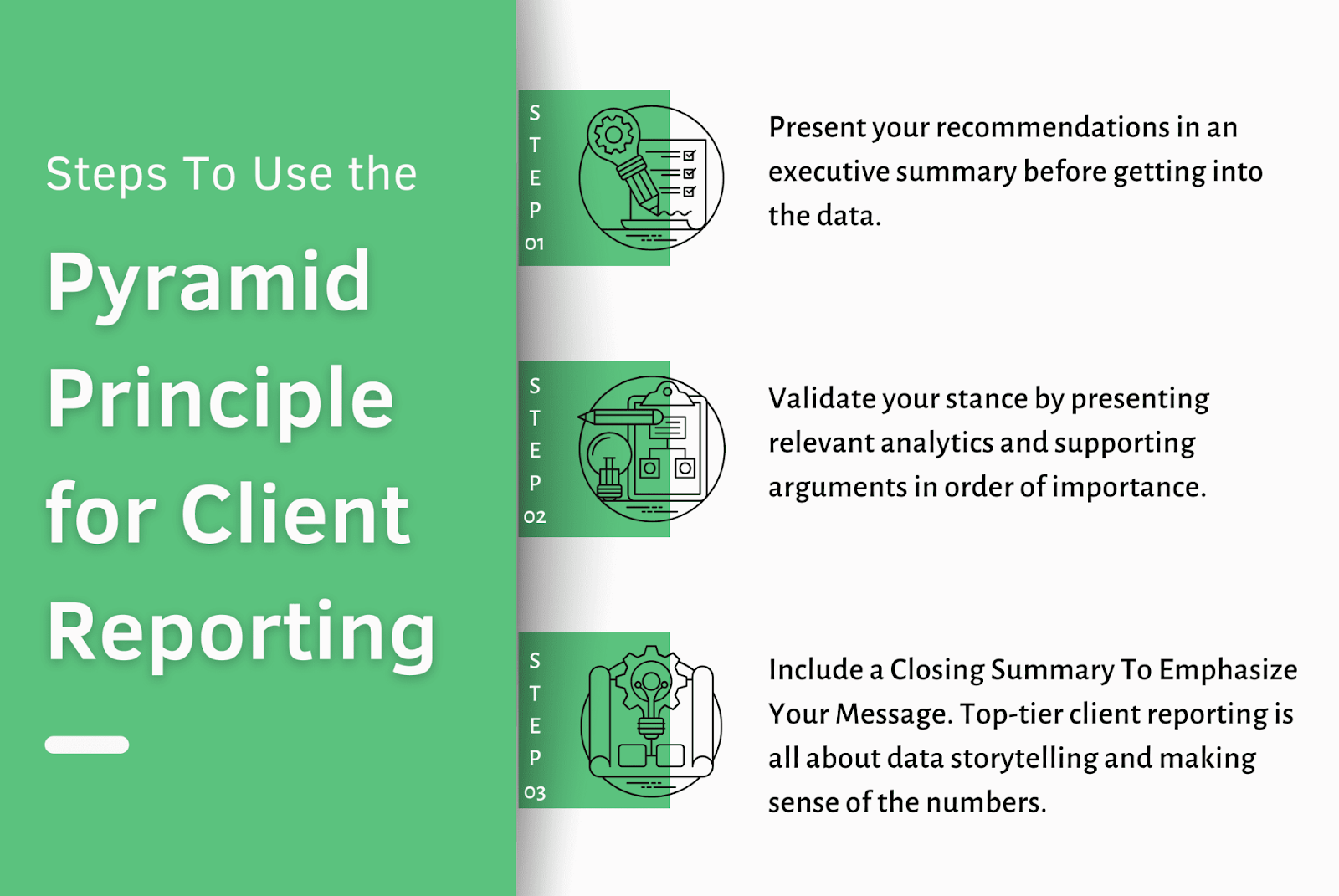
Common Pitfalls and How to Avoid Them
Even experienced agencies make critical mistakes that damage agency-client relationship and limit growth potential. Understanding these pitfalls helps maintain healthy partnerships while growing revenue.
Overpromising Trap
The biggest threat to agency relationships comes from unrealistic promises made during upselling conversations. Desperate agencies often guarantee results that even perfect execution cannot deliver.
- Timeline Realism: SEO results require time, especially for competitive markets. Always provide conservative timelines that account for algorithm changes and competitive responses.
- Ranking Guarantees: Never guarantee specific ranking positions. Search algorithms change constantly, and competitor actions affect results regardless of strategy quality.
- Traffic Projections: Base growth projections on historical performance and industry benchmarks rather than ideal scenarios.
Service Overlap Confusion
Adding services without clear differentiation creates confusion and reduces perceived value. Clients should understand exactly what each service includes and how it contributes to overall success.
- Clear Scope Definition: Document exactly what each service includes and excludes. This prevents scope creep and maintains profitability.
- Outcome Specification: Define success metrics for each service component. Clear measurements prevent disputes and demonstrate value.
- Communication Protocols: Establish how different services integrate and how results will be reported. Clients need unified strategies, not disconnected tactics.
Further Reading: Upselling Made Easy: 7 Strategies to Increase Your Revenue & Expand Your Accounts
Maximizing Long-Term Client Value
Sustainable agency growth comes from expanding successful client relationships rather than constantly acquiring new accounts. The most profitable agencies focus on lifetime value optimization through strategic service expansion.
Partnership Evolution Strategy
Transform vendor relationships into strategic partnerships that grow alongside client businesses. This approach creates natural expansion opportunities and increases client retention rates.
- Business Goal Alignment: Regular strategy sessions should focus on evolving business objectives rather than just SEO performance. As clients grow, their digital marketing needs expand naturally.
- Market Expansion Support: When clients enter new markets or launch new products, your agency should be positioned as the natural choice for expanded digital marketing support.
- Technology Integration: Stay ahead of SEO technology trends and proactively recommend tools and strategies that support client growth objectives.
Value Demonstration Mastery
Consistent value demonstration creates environments where upsells become logical business decisions rather than difficult sales conversations.
- Success Story Documentation: Maintain detailed case studies of client successes that can be shared (with permission) to demonstrate agency capabilities and results.
- Industry Recognition: Pursue industry awards and recognition for client campaigns. External validation strengthens agency credibility and supports premium pricing.
- Thought Leadership: Publish insights and strategies that position your agency as an industry expert. This authority supports consultative selling approaches and justifies expanded service investments.
How DashClicks Empowers Agencies to Resell Top-Tier SEO Services?
DashClicks provides a seamless and efficient way for agencies to deliver industry-leading SEO services to their clients without the need to build in-house expertise. By offering a white-label platform, DashClicks allows agencies to resell expertly crafted SEO solutions under their own brand. This enables agencies to scale their operations while ensuring exceptional results for their clients.
The platform is equipped with advanced tools to manage campaigns, track performance, and generate comprehensive reports, ensuring transparency and efficiency. Their white label SEO services include keyword research, on-page and off-page optimization, link-building strategies, and local SEO enhancements, all tailored to meet the specific needs of diverse industries. These services are executed by experienced specialists, guaranteeing top-tier results.
Additionally, DashClicks offers onboarding and ongoing support, ensuring that partner agencies have the knowledge and resources to maximize client satisfaction. With DashClicks, agencies can confidently expand their service offerings, boost client retention, and drive long-term growth, all while maintaining a focus on delivering the best SEO solutions available.
Building Your Upselling Success Framework
Smart agencies don't rely on intuition or hope when expanding client relationships. They follow systematic approaches that consistently deliver results while maintaining trust and satisfaction.
The most successful SEO reseller program partnerships combine strategic thinking with flawless execution. Whether you're leveraging white label SEO company resources or building internal capabilities, the principles remain constant: deliver exceptional value, communicate clearly, and always prioritize long-term relationships over short-term revenue.
Start by auditing your current client relationships for untapped opportunities. Document performance wins, identify growth possibilities, and develop presentation materials that focus on business impact rather than SEO features. Remember that the best upsells feel like natural progressions rather than sales pitches.
Your agency's growth depends on your ability to expand successful partnerships strategically and sustainably. Master these principles, and watch your average client value soar while your reputation as a trusted advisor grows stronger with every successful expansion.
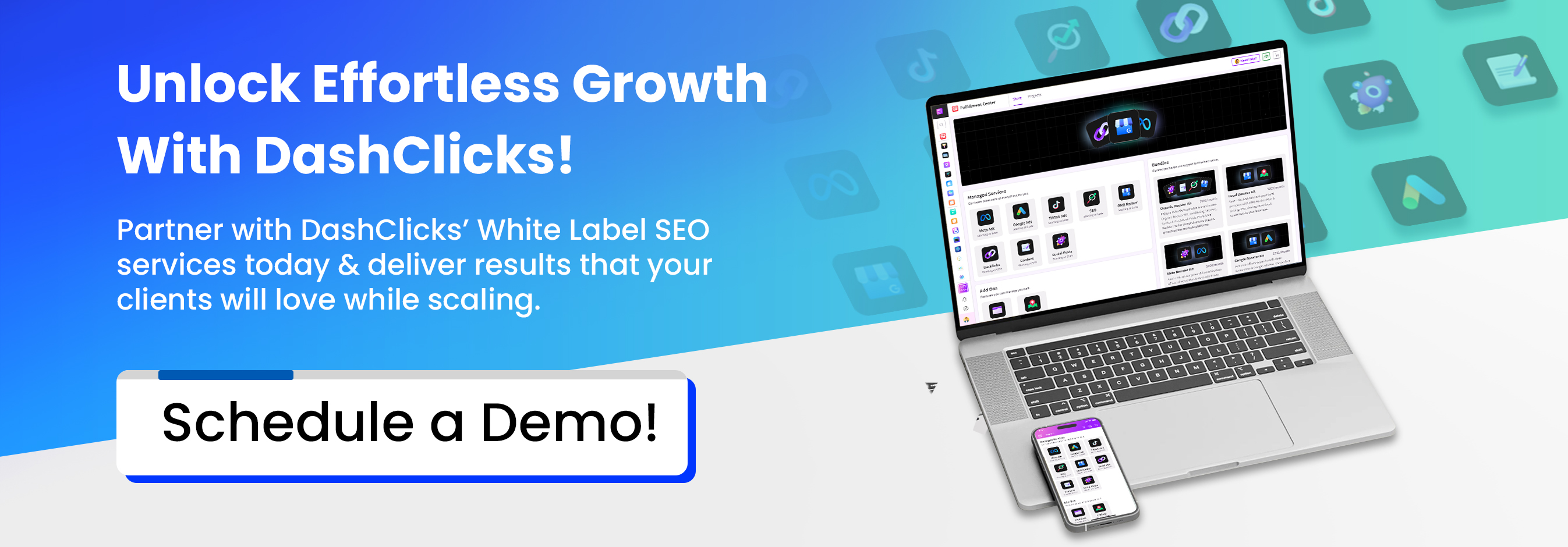

How Agencies Master White Label SEO Pricing for Maximum Profit
Digital marketing agencies face constant pressure to expand their service offerings while maintaining healthy profit margins. White label SEO services present an attractive solution, allowing agencies to deliver comprehensive SEO solutions without building an in-house team. However, the key to success lies in strategic pricing that maximizes profitability while remaining competitive.
Understanding how to price white label SEO services effectively can transform your agency's revenue stream. The challenge isn't just finding affordable white label SEO services for agencies—it's structuring your pricing to ensure sustainable growth and client satisfaction. Smart agencies recognize that successful SEO reselling requires a calculated approach to pricing that considers market dynamics, client expectations, and profit objectives.
This comprehensive guide reveals proven strategies agencies use to price their white label SEO services profitably. From understanding cost structures to implementing value-based pricing models, you'll discover actionable insights that drive revenue growth and competitive advantage.
Understanding White Label SEO Agency Pricing Fundamentals
White label SEO pricing operates on a foundation of cost-plus-margin calculations, but successful agencies dig deeper into value-based pricing strategies. Your pricing structure should reflect not just your costs to outsource SEO, but the tangible value you deliver to clients.
Most profitable agencies maintain margins between 40-60% on their white label SEO services. This range provides sufficient buffer for operational costs while ensuring competitive market positioning. However, achieving these margins requires strategic planning and careful vendor selection.
The foundation of profitable pricing starts with understanding your true costs. Beyond the direct fees paid to your white label SEO agency, consider additional expenses like project management time, client communication, reporting tools, and quality assurance processes. These hidden costs can significantly impact your actual profit margins if not properly accounted for.
Key Cost Components to Track:
- Direct provider fees
- Project management overhead
- Reporting and communication tools
- Quality assurance time
- Client onboarding expenses
- Account management resources
Discovering the Right White Label SEO Pricing
Selecting the right white label SEO pricing involves careful consideration to ensure profitability and sustainability while maintaining service quality. Here are detailed pointers to guide you:
- Understand Your Cost Structure: Begin by analyzing all direct and indirect costs associated with the service. This includes fees from your white label SEO provider, internal labor costs for client communication, reporting, and quality assurance, and any additional tools or software expenses.
- Assess Your Provider’s Pricing Models: White label SEO services for agencies may offer different pricing structures, such as per-project pricing, monthly retainers, or pay-as-you-go plans. Evaluate which model aligns best with your business model and revenue projections.
- Factor in Market Rates and Competitor Benchmarking: Research the prevailing market rates for similar SEO services. Benchmarking competitors’ pricing can help you position your services competitively without undervaluing your offering.
- Determine Your Desired Profit Margins: Decide on the profit margins you aim to achieve for each project or client. Ensure that your pricing accounts for all expenses while leaving room for healthy margins to grow your business.
- Consider the Scalability of Pricing: Analyze how your pricing will scale as your client base grows. Ensure that the pricing model is sustainable and doesn’t erode profitability with increased workload or resources.
- Account for Value-Added Services: If you’re offering additional services like content creation, advanced analytics, or personalized strategies, reflect the value of these enhancements in your pricing.
- Review Contract Terms and Flexibility: Some white label providers offer flexible contract options, which can benefit your cash flow and operational stability. Short-term commitments or adjustable services may help you adapt to changing client demands.
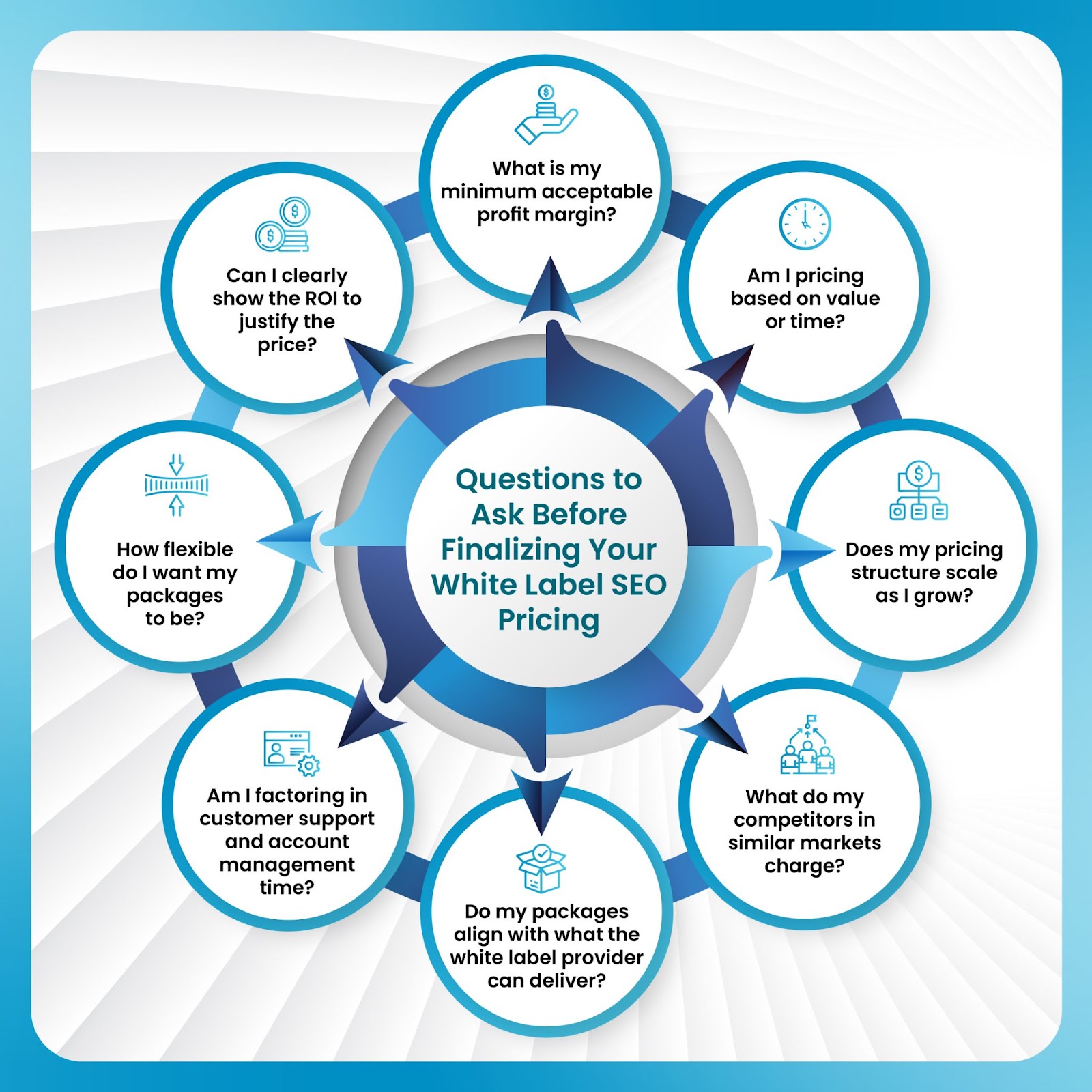
Selecting the right pricing strategy goes beyond choosing numbers—it’s about aligning costs, value, and customer expectations to build a thriving, sustainable business while fostering strong client relationships.
What is a Good Margin for SEO Resellers?
Determining a good profit margin as an SEO reseller is crucial for sustaining your business and ensuring competitive pricing. Here are some detailed factors to consider when calculating your margin:
- Industry Standards: Profit margins for SEO resellers typically range between 20% to 50%, depending on the services provided, competition, and industry trends. High-quality, white-label providers often command a higher margin due to premium deliverables.
- Costs of Outsourcing: Factor in the pricing charged by your SEO provider, including additional fees for specific services or add-ons. Ensure your reseller price leaves sufficient room for markup while still offering competitive rates to your clients.
- Value-Added Services: Offer complementary services such as analytics reporting, consultancy, or performance reviews to increase perceived value, allowing you to charge a higher margin while justifying the cost to clients.
- Volume vs. Margin Trade-Off: A lower profit margin may work if you’re targeting high volumes of clients or projects. Conversely, a higher margin might suit businesses focusing on fewer, high-value accounts.
- Client Retention Metrics: Aiming for sustainable profit margins should align with long-term partnerships with clients. Lower churn rates can help offset lower margins by creating a steady and predictable revenue stream.
- Operational Costs: Factor in indirect costs such as marketing, client acquisition, and labor for managing accounts. Including these considerations ensures your chosen margin supports sustainable business operations.
By carefully analyzing these factors, you can establish a balanced profit margin that ensures competitive pricing while fostering long-term growth and client satisfaction.
Essential Factors That Drive White Label SEO Pricing
1. Market Competition and Positioning
Your pricing strategy must align with competitive market realities while highlighting your unique value proposition. Agencies operating in highly competitive markets often need flexible pricing structures that can adapt to client budgets while maintaining profitability.
Research shows that agencies charging premium rates for white label SEO services typically offer enhanced reporting, dedicated account management, or specialized industry expertise. These value-adds justify higher pricing and improve client retention rates.
2. Scope and Complexity of Services
The breadth of services within your SEO packages directly impacts pricing potential. Comprehensive packages, including technical SEO, content creation, link building, and local optimization, command higher prices than basic keyword optimization services.
Successful agencies structure their offerings in tiered packages, allowing clients to choose service levels that match their budgets and objectives. This approach maximizes revenue opportunities while accommodating diverse client needs.
3. Client Industry and Competition Level
Different industries present varying levels of SEO difficulty and competition. Legal, medical, and financial services typically require more intensive SEO efforts, justifying higher pricing structures. Meanwhile, local service businesses might need more affordable entry-level packages.
Understanding industry-specific SEO challenges allows agencies to price services appropriately while setting realistic client expectations. This knowledge becomes crucial when positioning your white label SEO services against competitors.
Strategic Pricing Models for Maximum Profitability
1. Value-Based Pricing Strategy
The most profitable agencies have shifted from cost-plus pricing to value-based models. This approach prices services based on the value delivered to clients rather than simply marking up vendor costs. Value-based pricing requires deep understanding of client businesses and clear ROI demonstration.
Implementing value-based pricing involves documenting client goals, establishing performance metrics, and regularly reporting on achieved results. Agencies using this model often achieve margins exceeding 70% while maintaining strong client relationships.
2. Tiered Service Packages
Offering multiple service tiers maximizes revenue opportunities across different client segments. A typical three-tier structure might include:
- Essential Package: Basic SEO fundamentals for budget-conscious clients.
- Growth Package: Comprehensive SEO with enhanced reporting and support.
- Premium Package: Full-service SEO with custom strategies and dedicated management.
This structure allows clients to choose appropriate service levels while providing clear upgrade paths as their businesses grow.
3. Performance-Based Pricing Components
Incorporating performance bonuses into your pricing structure can justify premium rates while aligning your success with client outcomes. Performance components might include bonuses for achieving specific ranking improvements, traffic increases, or lead generation targets.
However, performance-based pricing requires careful contract structuring to avoid disputes and ensure profitability. Successful agencies typically limit performance components to 10-20% of total fees while maintaining base monthly charges that cover operational costs.
Calculating Profit Margins and Cost Structures
1. Understanding True Service Costs
Accurate cost calculation extends beyond vendor fees to encompass all resources required for service delivery. Comprehensive cost analysis includes direct vendor payments, internal labor costs, technology expenses, and overhead allocation.
Many agencies underestimate the time required for client management, reporting, and quality assurance. Tracking these activities reveals true service costs and enables more accurate pricing decisions.
2. Margin Optimization Strategies
Achieving optimal profit margins requires balancing competitive pricing with operational efficiency. Formula to calculate margin:
Margin (%) = (Selling Price – Reseller Cost) ÷ Selling Price × 100
Successful agencies implement standardized processes that reduce delivery costs while maintaining service quality.
Margin Enhancement Tactics:
- Streamlined reporting processes
- Automated client communications
- Bulk purchasing agreements with vendors
- Efficient project management workflows
- Standardized service delivery procedures
3. Volume-Based Pricing Advantages
Agencies managing multiple SEO clients often negotiate volume discounts with their white label SEO agency partners. These savings can be reinvested in enhanced service delivery or passed to clients through competitive pricing.
Volume-based relationships also provide negotiating leverage for custom service modifications or priority support arrangements that differentiate your offerings in the marketplace.
Client Communication and Value Justification
1. Demonstrating ROI and Value
Successful white label SEO pricing requires clear value demonstration throughout the client relationship. Regular reporting on keyword rankings, organic traffic growth, and business impact justifies your pricing while building client trust.
Effective reporting combines technical SEO metrics with business-focused outcomes that clients understand and value. This approach transforms SEO from a cost center into a recognized profit driver for client businesses.
2. Managing Client Expectations
Transparent communication about SEO timelines, expected outcomes, and pricing rationale prevents disputes and improves client satisfaction. Agencies that clearly explain their pricing structure and service delivery process maintain higher client retention rates.
Setting realistic expectations involves educating clients about SEO complexity while highlighting your expertise in managing these challenges through your white label SEO services.
3. Upselling and Service Expansion
Well-structured pricing facilitates natural upselling opportunities as client businesses grow. Agencies should design their service tiers to accommodate business expansion while providing clear value at each level.
Successful upselling involves identifying client growth opportunities and presenting relevant service enhancements that support their evolving needs.

Industry Best Practices and Common Pitfalls
1. Avoiding Pricing Mistakes
Common pricing errors include underestimating delivery costs, failing to account for client management time, and competing solely on price rather than value. These mistakes erode profit margins and compromise service quality.
Successful agencies establish minimum pricing thresholds that ensure profitability while maintaining competitive positioning in their target markets.
2. Competitive Analysis and Market Positioning
Regular competitive analysis informs pricing adjustments and service positioning strategies. Understanding competitor offerings and pricing structures helps agencies identify differentiation opportunities and optimal pricing ranges.
However, competing solely on price often leads to margin erosion and unsustainable business models. Focus on value differentiation while maintaining competitive pricing within your target market segments.
3. Long-term Profitability Considerations
Sustainable pricing strategies balance immediate profitability with long-term client relationships. Short-term profit maximization through excessive pricing can damage client retention and market reputation.
Successful agencies view client relationships as long-term partnerships, pricing services to ensure mutual success and sustainable growth for both parties.
How to Make Reseller SEO Packages More Profitable?
To maximize the profitability of reseller SEO packages, agencies must focus on both operational efficiency and value creation. Here’s how you can do that:
- Offer Tiered Pricing Models: Creating tiered pricing models allows agencies to cater to different client budgets while maximizing profitability. Include basic, advanced, and premium packages, each designed to offer increasing levels of value and service. This enables clients to select options that meet their needs while encouraging upsells.
- Bundle Additional Services: Enhance your SEO packages by bundling complementary services such as content creation, social media marketing, or local pages optimization. Bundling not only increases perceived value but also encourages clients to invest more, improving your profit margins.
- Focus on High-Value Niches: Target industries or niches that demand specialized SEO services with higher profit potential. Research verticals such as healthcare, legal, or e-commerce, where clients are often willing to pay a premium for expertise and results-driven initiatives.
- Leverage Automation Tools: Invest in automation tools and software to streamline repetitive tasks such as keyword tracking, reporting, and performance analysis. These tools not only save time but also reduce operational costs, subsequently increasing overall profitability.
- Upsell After Client Success: Once you’ve delivered proven results to your clients, introduce enhanced services or premium packages that align with their growth objectives. Customer satisfaction and trust build the perfect foundation for higher-value upsells that boost revenue.
- Optimize Your Operational Costs: Regularly review your service delivery processes to identify potential cost-saving opportunities. Outsourcing certain tasks or partnering with white-label providers can significantly reduce expenses without compromising quality, improving net profits.
- Create Long-Term Contracts: Encourage clients to sign long-term agreements by offering incentives like discounted monthly rates for extended commitments. This ensures consistent revenue flow and allows better financial planning for your agency.
- Build a Strong Value Proposition: Clearly define and communicate what sets your reseller SEO packages apart from competitors. Highlight unique advantages such as exceptional reporting, dedicated account management, or industry-specific expertise to justify premium pricing.
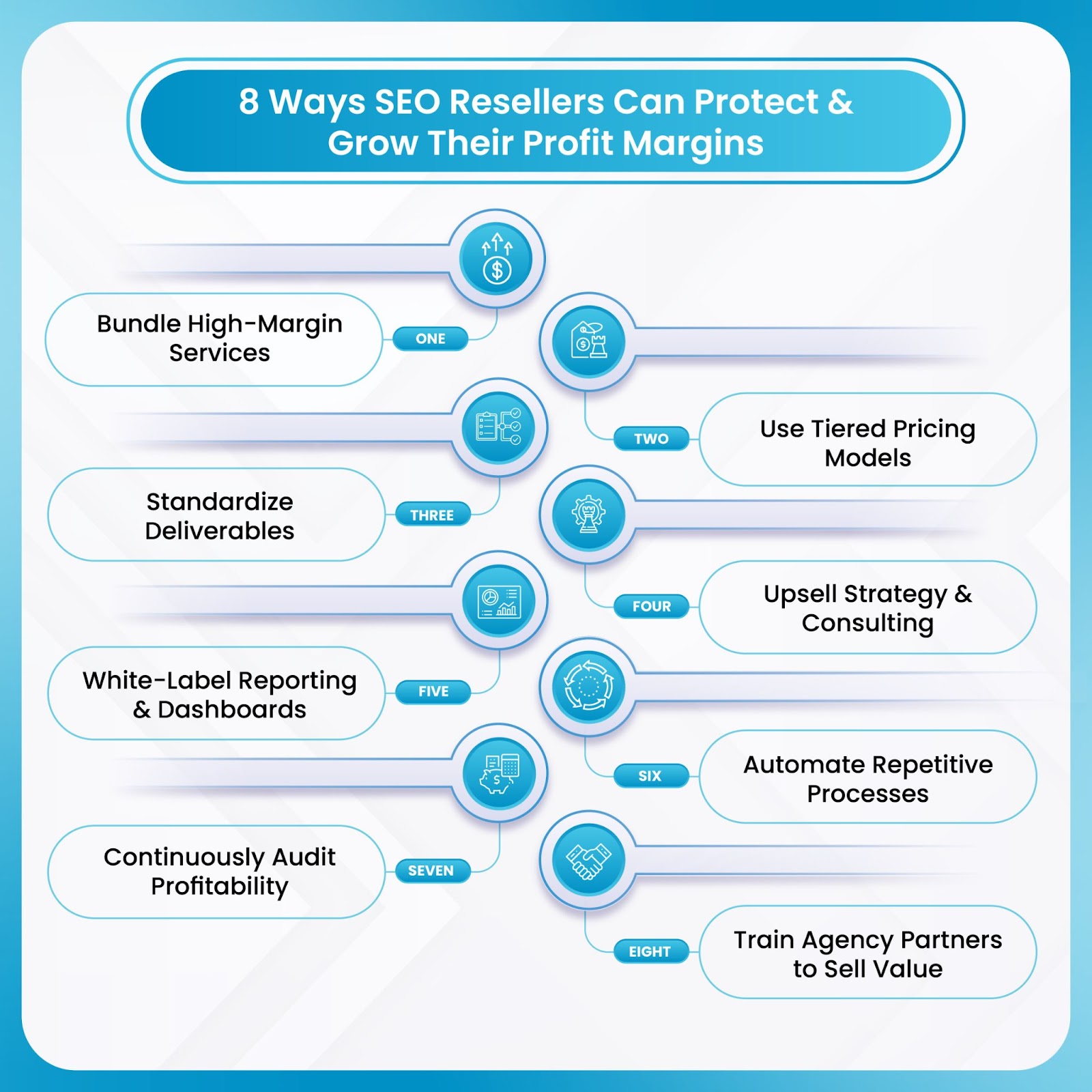
By implementing these strategies, agencies can significantly enhance the profitability of reseller SEO packages while delivering substantial value to clients.
Choose DashClicks White-Label SEO Solutions to Boost Agency Success
White label SEO services by DashClicks are designed to help agencies deliver outstanding results to their clients while boosting profitability. With scalable, white-label solutions, agencies can manage their digital marketing efforts without needing additional in-house resources.
DashClicks offers robust SEO packages that include in-depth keyword research, on-page and off-page optimization, content creation, and detailed reporting. These comprehensive services ensure improved search engine rankings and measurable outcomes, helping agencies enhance client satisfaction and retention.
DashClicks offers three tailored SEO plans to meet varying needs:
- Pro: A perfect starting point for agencies looking to provide foundational SEO services.
- Plus: A mid-tier option with enhanced features for more comprehensive optimization.
- Platinum: The ultimate plan, offering advanced solutions for maximum impact and scalability.
By partnering with DashClicks, agencies can confidently deliver high-quality SEO services under their brand name, empowering them to build trust, retain clients, and drive revenue growth.
Frequently Asked Questions
Q1. What Margin Should Agencies Target for White Label SEO Services?
Ans. Most successful agencies maintain margins between 40-60% on white label SEO services. This range provides adequate profitability while remaining competitive in most markets.
Q2. How Do Agencies Justify Premium Pricing for White Label SEO?
Ans. Premium pricing requires clear value demonstration through enhanced reporting, dedicated account management, specialized expertise, or guaranteed performance outcomes.
Q3. Should Agencies Use Fixed or Variable Pricing for SEO Services?
Ans. Most agencies use fixed monthly pricing with variable components based on service tiers or performance bonuses. This approach provides predictable revenue while accommodating client diversity.
Q4. How Often Should Agencies Review Their White Label SEO Pricing?
Ans. Quarterly pricing reviews ensure market competitiveness while annual comprehensive evaluations allow for strategic adjustments based on business growth and market changes.
Q5. What’s the Best Way to Handle Client Price Objections?
Ans. Address price objections by focusing on value delivered, ROI potential, and competitive advantages. Provide alternative service tiers that accommodate different budget levels.
Maximizing Your White Label SEO Success
Strategic pricing represents the foundation of profitable white label SEO operations. Agencies that master pricing optimization while maintaining exceptional service delivery create sustainable competitive advantages that drive long-term success.
Success with white label SEO services for agencies requires ongoing attention to market dynamics, cost management, and value delivery. The agencies that thrive are those that view pricing as a strategic tool rather than a simple markup calculation.
Ready to optimize your white label SEO pricing strategy? Start by conducting a comprehensive analysis of your current costs, competitive positioning, and client value delivery. This foundation will guide pricing decisions that maximize profitability while building lasting client relationships.
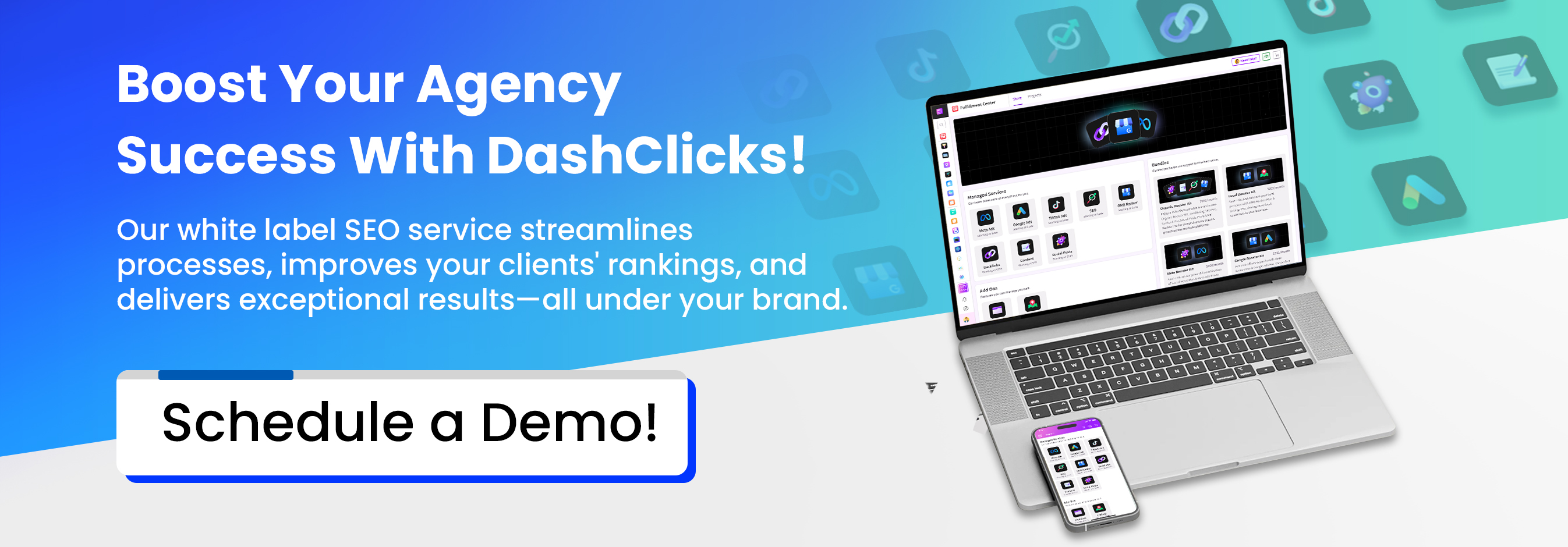

Managing Client Volume Without Hiring: The Role of SEO Resellers
Running a successful digital marketing agency means balancing client demands with limited resources. You're juggling multiple campaigns, struggling to hire skilled SEO specialists, and watching competitors snatch clients while you're stuck in operational bottlenecks.
Meanwhile, the global SEO market is booming, estimated at $82.3 billion in 2023 and projected to soar to $143.9 billion by 2030, growing at a CAGR of 8.3%. Mobile SEO alone is expected to expand even faster, at a 10% CAGR. At the same time, search advertising spending is forecasted to reach $483.5 billion by 2029 (Statista), highlighting the rising demand for search visibility across industries.
What if there was a way to expand your service offerings, handle more clients, and boost revenue without the headache of hiring and training new employees? Enter the game-changing solution that's transforming how agencies scale: SEO reseller programs.
This comprehensive guide reveals how partnering with an SEO reseller can unlock explosive growth for your agency. You'll discover proven strategies to manage increased client volume, access specialized expertise, and maximize profits—all while maintaining the quality that built your reputation.
What Makes SEO Reseller Programs Your Growth Engine?
An SEO reseller program allows your agency to offer comprehensive search engine optimization services under your brand name without building an in-house team. Think of it as your secret weapon for instant expertise and scalability.
These programs provide white label SEO services that seamlessly integrate with your existing offerings. Your clients receive professional SEO campaigns while you focus on what you do best—building relationships and growing your business.
The Power Behind White Label SEO Services
White label SEO services for agencies operate on a simple yet powerful principle: you sell the services, the reseller delivers the results. This partnership model eliminates the need for:
- Expensive Hiring Processes
- Lengthy Training Periods
- Specialized SEO Software Subscriptions
- Technical Infrastructure Investments
Instead, you gain immediate access to a team of SEO professionals who understand the latest algorithm updates, keyword research techniques, and link-building strategies that drive real results.

Why Traditional Scaling Methods Fall Short?
Many agencies attempt to scale by hiring full-time SEO specialists, but this approach often leads to significant challenges that can hinder growth and efficiency:
- Resource Drain:. Hiring experienced SEO professionals is expensive, with annual salaries ranging from $60,000 to over $100,000 per employee. On top of that, agencies must account for benefits, ongoing training, and potential turnover costs, which can strain budgets, especially for smaller operations.
- Time Investment: New hires typically require 3-6 months of onboarding and training before they can contribute meaningfully to your agency's projects. During this period, you're paying full salaries without seeing direct returns on your investment, which can delay momentum and impact profitability.
- Skill Gaps: SEO is a multi-faceted discipline that includes technical SEO, content optimization, link-building strategies, and advanced analytics interpretation. Finding candidates who excel in all these areas is becoming increasingly difficult, leading to potential gaps in service delivery and missed opportunities.
- Operational Complexity: Scaling a team with full-time employees adds layers of complexity to your operations. Larger teams require additional management, HR support, and, in many cases, expanded office space. This can create inefficiencies and divert focus from high-priority tasks that drive revenue.
Considering these factors, agencies need to carefully evaluate whether hiring in-house is the best path to scale effectively or if alternative solutions, such as outsourcing or leveraging specialized tools, may provide a more strategic way forward.
How SEO Resellers Transform Your Agency Operations?
1. Instant Expertise Access
Partnering with an SEO reseller gives you instant access to a team of specialists with years of experience in driving results. These experts have mastered:
- Technical SEO Audits and Implementations: Identify and resolve site issues that hinder rankings, ensuring optimal performance.
- Advanced Keyword Research and Competitive Analysis: Discover high-value keywords and understand your competition to stay ahead in the game.
- Content Optimization Strategies That Convert: Fine-tune your content to improve organic visibility while driving engagement and conversions.
- Link-Building Campaigns That Boost Domain Authority: Build high-quality backlinks to increase your site’s credibility and search engine rankings.
- Performance Tracking and Reporting Systems: Monitor progress with detailed reports and data-driven insights that keep you and your clients informed.
With an SEO reseller, you can deliver expert-level services without the need for in-house training or hiring, giving you a competitive edge.
2. Scalable Service Delivery
Managing the ups and downs of client demands can be challenging. Unlike traditional hiring, SEO reseller program scale seamlessly with your business needs. Whether you’re handling 5 clients or 50, you won’t need to worry about capacity constraints. Your reseller partner absorbs the workload fluctuations, ensuring consistent, high-quality delivery. This lets you focus on what matters most—client acquisition, retention, and growing your business.
3. Predictable Cost Structure
Hiring in-house SEO specialists can be unpredictable and expensive. SEO reseller programs replace these variable costs with transparent, scalable pricing. Most resellers offer tiered packages designed to align costs with your revenue, enabling you to maintain profitability as your agency grows. By knowing exactly what you’ll spend, you can budget confidently while providing exceptional service without compromising your bottom line.
Partnering with an SEO reseller is a smart, flexible way to elevate your business while keeping costs and operations manageable.
The Strategic Benefits That Drive Growth
1. Enhanced Client Retention
Agencies using SEO reseller programs report 40% higher client retention rates. Why? Because professional SEO results keep clients satisfied, engaged, and confident in your agency's ability to deliver long-term value. SEO reseller programs allow you to offer consistent improvements in search rankings, organic traffic, and lead generation, which means clients are more likely not only to stay but also to expand their investment and recommend your services to others, helping your business grow sustainably.
2. Competitive Advantage
Having access to specialized SEO expertise gives your agency a significant edge over competitors who rely solely on their in-house teams. SEO reseller programs let you:
- Offer broader and more comprehensive service packages tailored to your clients’ needs.
- Deliver faster, measurable results through proven methodologies that save time and resources.
- Handle complex technical challenges with confidence, even in competitive industries.
- Stay up to date with rapidly evolving SEO best practices without dedicating additional internal resources.
These advantages allow you to position your agency as an industry leader, capable of offering high-value services that competitors may struggle to match.
3. Revenue Multiplication
SEO reseller programs typically operate on markup models that allow for 50-100% profit margins. This structure means that every SEO package sold through your agency can generate significant revenue while the reseller handles the day-to-day service delivery. By partnering with a reliable SEO reseller, you can scale your business without the need to hire and train an extensive in-house SEO team. This model not only saves costs but also allows for predictable and scalable revenue growth.
Choosing the Right SEO Reseller Partner
1. Reputation and Track Record
Selecting the right SEO reseller partner is critical to your success. Research potential partners thoroughly and look for:
- Detailed case studies that demonstrate real client results across various industries and challenges.
- Transparent reporting capabilities that give you full visibility into project progress and success metrics.
- Industry certifications and recognition that showcase expertise and credibility.
- Strong client testimonials, reviews, and references that highlight a history of satisfied partners.
2. Service Comprehensiveness
The best SEO reseller program go beyond basic services and offer complete SEO solutions. These should include:
- In-depth technical SEO audits and fixes to address site performance and errors.
- On-page optimization strategies that enhance content relevance and usability.
- High-quality content creation and optimization to align with search intent and drive engagement.
- Effective link-building campaigns to boost domain authority and improve rankings.
- Specialized local SEO services to help clients dominate their regional markets.
- Detailed analytics and reporting to track success and identify areas for improvement.
Having access to a full suite of SEO services ensures you can meet the diverse needs of your clients, regardless of their industry or goals.
3. Communication Excellence
Strong communication is the foundation of a successful partnership. Your SEO reseller partner should provide:
- Regular progress updates and detailed reports that keep you informed at every stage.
- Direct access to dedicated account managers who understand your unique needs.
- Transparent project timelines that set clear expectations for deliverables.
- Responsive customer support to address questions and concerns promptly.
Effective communication helps build trust and ensures that client relationships remain strong, even when services are delivered by a third party.
Implementation Strategies for Maximum Success
1. Set Clear Expectations
From the beginning, establish specific goals and metrics to measure progress. Define:
- Target keyword rankings to focus on improving visibility for key client priorities.
- Traffic growth objectives to track the increase in overall site engagement.
- Conversion rate improvements that demonstrate the impact on lead generation.
- Reporting frequency and format to ensure clear communication of results.
- Communication protocols to streamline collaboration with your reseller partner.
Having well-defined expectations keeps your team and reseller aligned on the desired outcomes.
2. Maintain Brand Consistency
Consistency is key to client trust and satisfaction. Work closely with your reseller to ensure they understand your brand voice, client communication style, and quality standards. This alignment ensures that clients receive a seamless experience and view your agency as the single point of contact for all their needs.
3. Monitor Performance Continuously
Track key performance metrics regularly, including:
- Organic traffic growth to gauge the effectiveness of SEO efforts.
- Keyword ranking improvements to ensure clients are gaining visibility.
- Lead generation increases to measure the impact on business outcomes.
- Client satisfaction scores to understand how well services are meeting expectations.
- Revenue per client to evaluate profitability and identify opportunities for upselling.
Regular performance reviews not only help identify optimization opportunities but also ensure your SEO reseller partnership delivers maximum value over time.
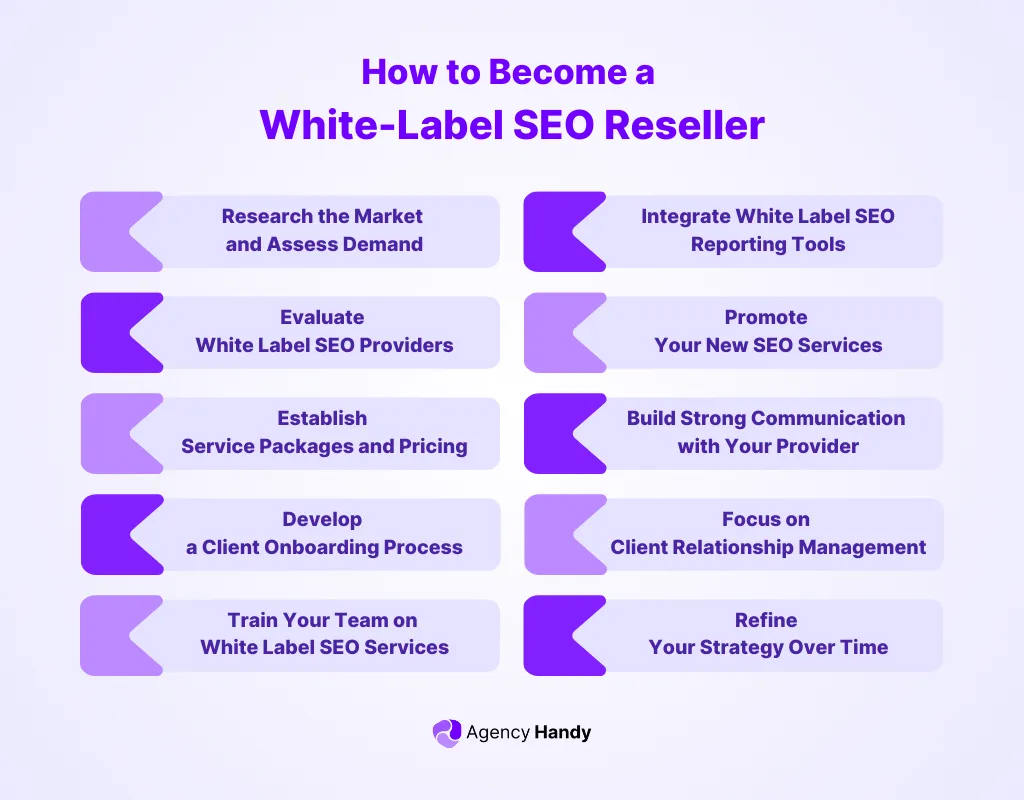
Image Source: AgencyHandy
Common Challenges and Solutions
1. Quality Control Concerns
Challenge: Ensuring consistent service quality across all client accounts.
Solution: Conduct regular quality audits, establish clear service level agreements (SLAs), and maintain open communication channels with your reseller to address issues quickly.
2. Client Communication
Challenge: Managing client expectations when services are delivered by a third party.
Solution: Maintain ownership of client relationships while leveraging your reseller's expertise. Present yourself as the strategic lead, ensuring clients see your agency as the primary driver of results, while your partner handles technical execution behind the scenes.
3. Pricing Strategy
Challenge: Balancing competitive pricing with profitable margins.
Solution: Research market rates thoroughly and price your services based on the value delivered rather than simply the hours worked. Highlight the tangible benefits your clients will receive, such as increased traffic, better rankings, and more leads.
Maximizing Your SEO Reseller Partnership
1. Leverage Expertise for Growth
Use your reseller's knowledge to:
- Identify new service opportunities that align with evolving client needs.
- Expand into specialized niches to attract more diverse clients.
- Develop comprehensive client packages that deliver end-to-end solutions.
- Stay ahead of industry trends, ensuring your agency remains competitive in a rapidly changing landscape.
2. Build Long-term Relationships
Treat your SEO reseller as a true partner, not just a vendor. Strong, collaborative relationships can lead to:
- Priority support during critical or busy periods.
- Early access to new services, tools, and capabilities.
- Collaborative problem-solving to overcome challenges together.
- Mutual growth opportunities that benefit both your agency and your reseller.
3. Focus on Core Strengths
With SEO handled by experienced professionals, you can redirect your energy toward what you do best, such as:
- Building and strengthening agency-client relationship.
- Driving business development and closing new deals.
- Creating strategic plans for agency growth.
- Enhancing your brand through innovative marketing initiatives.
By partnering with a trusted SEO reseller, you can scale your agency, improve client satisfaction, and unlock new opportunities for growth—all while delivering exceptional results.
Why DashClicks is the Perfect SEO Reseller Partner for Your Agency?
Choosing the right SEO reseller partner can make all the difference in helping your agency grow, and DashClicks is a standout choice for several compelling reasons. Here's why DashClicks sets itself apart as the ultimate partner for agencies looking to scale their SEO services:
- Proven Track Record of Success: DashClicks has a history of delivering real, measurable results for its partners. With years of experience in the industry, they have developed a system that works, helping agencies build trust and credibility with their clients.
- Cutting-Edge Tools and Technology: They offers state-of-the-art tools to streamline SEO processes, from analytics to campaign management. Their advanced platform makes it easier for you to track progress, manage projects, and deliver results effectively.
- Expertise You Can Rely On: Their team of SEO professionals brings deep industry knowledge and proven strategies to every campaign. This ensures your clients always receive the highest quality service, helping you exceed expectations.
- Seamless White-Label Solutions: They also provide completely white-label services, meaning your clients will see your agency’s name and branding on every deliverable. This makes it easy for you to provide professional SEO services without the need to hire in-house specialists.
- Ease of Scaling Your Agency: With DashClicks handling the heavy lifting of SEO campaigns, you can focus on growing your business. Their scalable solutions allow you to serve more clients without becoming overwhelmed by extra workload.
- Elevating Your Business, Not Just Outsourcing: Unlike basic outsourcing, DashClicks becomes a true extension of your agency. Partnering with them means not only improving your service offerings but also enhancing your agency’s reputation for delivering top-tier results.
Partnering with DashClicks is more than just outsourcing work – it’s about leveraging a trusted system to help your agency succeed. Whether you're looking to save time, improve efficiency, or scale quickly, they can help take your business to the next level.
Transform Your Agency Today
SEO reseller programs offer the fastest, most cost-effective path to agency growth. By partnering with experienced SEO professionals, you eliminate hiring challenges, reduce operational complexity, and unlock new revenue streams.
The agencies thriving in competitive markets aren't those trying to do everything in-house—they're the ones smart enough to leverage specialized partnerships for maximum impact.
Ready to scale your agency without the growing pains? Research SEO reseller programs that align with your goals, evaluate potential partners carefully, and take the first step toward transforming your business. Your clients deserve professional SEO results. Your agency deserves profitable growth. An SEO reseller program delivers both.
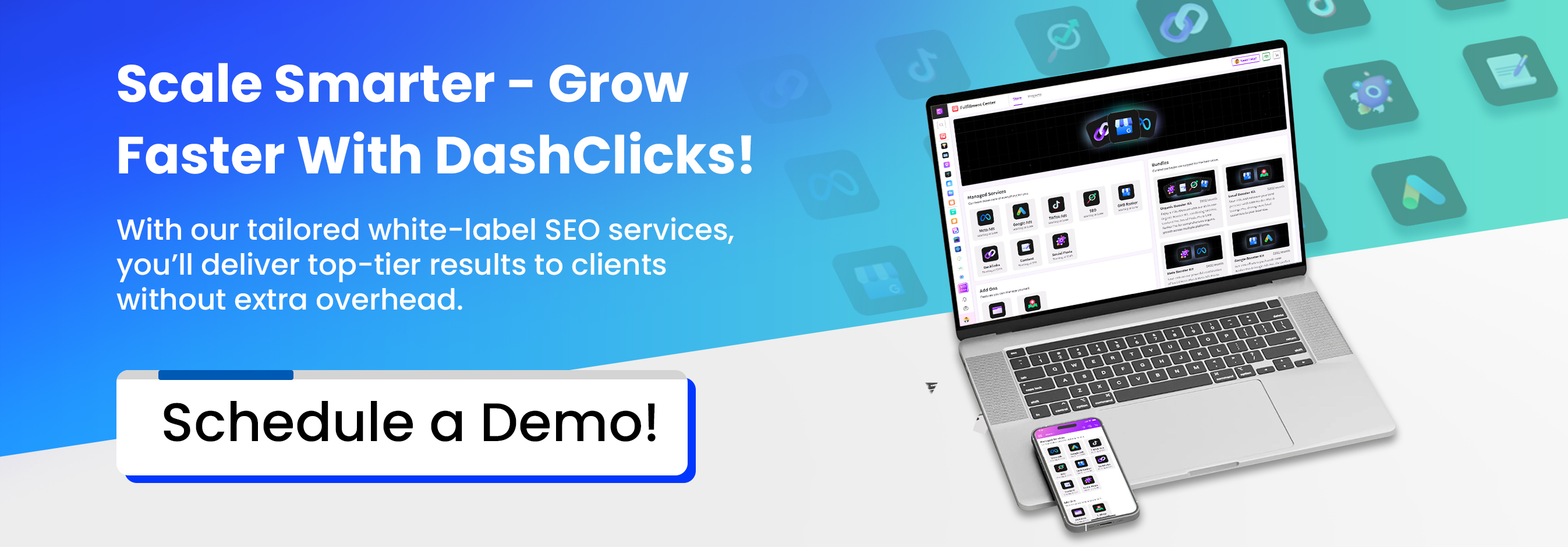

Red Flags When Vetting a White Label SEO Partner
Selecting the right white label SEO partner can make or break your agency's reputation and client relationships. With 70% of marketers viewing SEO as more effective than PPC for generating sales, the stakes have never been higher for choosing a reliable white label SEO company.
White label SEO partnerships allow agencies to expand their service offerings without building in-house expertise. However, not all SEO white label services are created equal. The wrong partner can damage client relationships, harm your brand reputation, and waste valuable resources. This comprehensive guide reveals the critical red flags to avoid when evaluating potential white label SEO partners.
The white label SEO market has exploded as agencies seek to meet growing client demand for search engine optimization services. Yet this rapid growth has led to a proliferation of providers offering varying quality levels.
Understanding these warning signs will help you identify trustworthy partners who can deliver consistent, high-quality results for your clients.
Understanding White Label SEO Partnerships
White label SEO involves partnering with a specialized company that provides SEO services under your agency's brand name. Your clients receive professional SEO services without knowing about the third-party provider. This arrangement allows agencies to offer comprehensive SEO solutions while focusing on their core competencies.
A quality white label SEO partner should seamlessly integrate with your existing operations. They handle the technical aspects of SEO while you maintain client relationships and brand control. The best partnerships create a win-win scenario where your agency expands its service portfolio and the white label provider gains steady business.
However, the success of these partnerships depends entirely on choosing the right white label SEO company. Poor partner selection can lead to subpar results, client dissatisfaction, and potential damage to your agency's reputation.
Major Red Flags to Avoid
1. Guaranteed Rankings and Unrealistic Promises
The biggest red flag when evaluating any white label SEO partner is guaranteed rankings. No legitimate SEO provider can guarantee specific SERP positions due to the unpredictable nature of search algorithms. Companies making such promises often resort to black-hat techniques that can result in search engine penalties.
Google's algorithm considers over 200 ranking factors, many of which are beyond any SEO provider's direct control. Competitor actions, algorithm updates, and market changes all influence rankings. Reputable white label SEO companies set realistic expectations and focus on sustainable, long-term growth rather than quick fixes.
Be especially wary of partners promising first-page rankings within unrealistic timeframes. Quality SEO requires patience, consistent effort, and strategic planning. Companies offering overnight success likely use risky tactics that could harm your clients' websites.
2. Lack of Transparency in Reporting
Transparency forms the foundation of successful white label partnerships. If a potential partner hesitates to share detailed reports, methodologies, or progress metrics, consider it a major warning sign. You need complete visibility into the work being performed on your clients' behalf.
Quality white label SEO services provide comprehensive reporting that you can confidently share with clients. This includes keyword rankings, traffic analytics, backlink profiles, and technical audit results. Without transparent reporting, you cannot properly manage client expectations or demonstrate ROI.
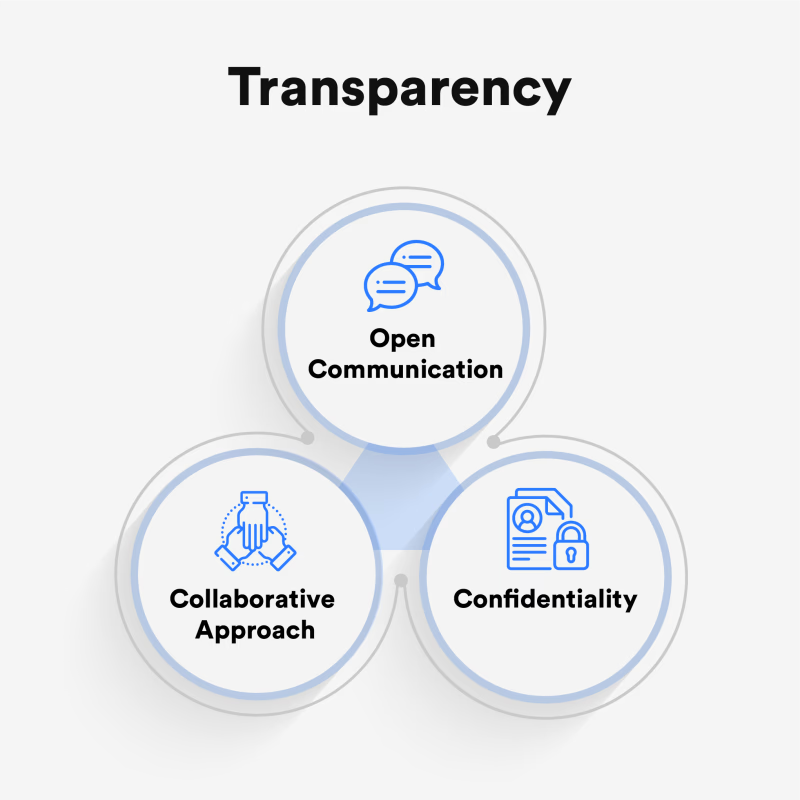
Image Source: WotNot
Some providers offer generic reports that lack client-specific insights. These cookie-cutter reports fail to provide actionable intelligence and may indicate a lack of personalized attention to your clients' unique needs.
Further Reading: The Importance of Transparency for Agency to Create Valuable Client Relationships
3. Suspiciously Low Pricing
While cost considerations are important, extremely low pricing often indicates compromised quality or unethical practices. Effective SEO requires skilled professionals, quality tools, and significant time investment. Providers offering prices far below market rates likely cut corners in crucial areas.
Low-cost providers may use automated tools exclusively, outsource work to inexperienced freelancers, or employ black-hat techniques. These approaches can deliver short-term results but often lead to long-term problems, including search engine penalties and damaged client relationships.
Consider the total cost of partnership beyond initial pricing. Hidden fees, poor results requiring remediation, and client churn due to subpar service can make cheap providers extremely expensive in the long run.
4. One-Size-Fits-All Approach
Every business has unique SEO needs based on industry, target audience, competition, and business goals. A white label SEO partner offering identical packages for all clients likely cannot deliver optimal results for your diverse client base.
Quality providers conduct thorough analyses of each client's situation before developing customized strategies. They consider factors like current website performance, competitive landscape, target keywords, and business objectives. This personalized approach ensures strategies align with specific client needs.
Avoid partners who refuse to customize their approach or claim their standard package works for everyone. Effective SEO requires flexibility and adaptation to each client's unique circumstances.
5. Poor Communication and Support
Communication challenges can severely impact white label partnerships. If a provider demonstrates poor communication during the sales process, expect similar issues during the partnership. Timely, clear communication is essential for managing client expectations and addressing urgent issues.
Evaluate response times, communication channels, and the quality of initial interactions. Partners should provide dedicated account managers, regular update calls, and responsive support for urgent situations. Poor communication can damage client relationships and reflect poorly on your agency.
Consider time zone differences and language barriers that might affect communication quality. Some providers offer 24/7 support, while others operate within specific business hours. Choose partners whose communication style and availability align with your client service standards.
6. Outdated or Black-Hat Techniques
SEO best practices evolve constantly as search engines update their algorithms. Partners using outdated techniques or black-hat practices can harm your clients' websites and your agency's reputation. Stay alert for providers who focus heavily on tactics like keyword stuffing, link farms, or content spinning.
Modern SEO emphasizes user experience, quality content, and technical optimization. Partners should demonstrate knowledge of current best practices, including Core Web Vitals, E-E-A-T (Experience, Expertise, Authoritativeness and Trustworthiness), and mobile-first indexing.
Ask potential partners about their approach to recent algorithm updates and how they adapt strategies accordingly. Providers who cannot discuss recent changes or rely on outdated techniques pose significant risks to your clients' online presence.
7. Lack of Industry Experience
While general SEO knowledge is important, industry-specific experience can significantly impact results. Partners with experience in your clients' industries understand unique challenges, competition levels, and effective strategies.
Evaluate case studies and client testimonials from similar industries. Partners should demonstrate successful outcomes for businesses comparable to your clients. This experience helps them develop more effective strategies and avoid common pitfalls.
However, don't automatically dismiss providers without direct industry experience if they demonstrate strong SEO fundamentals and willingness to learn. Sometimes fresh perspectives can identify opportunities that industry veterans might overlook.
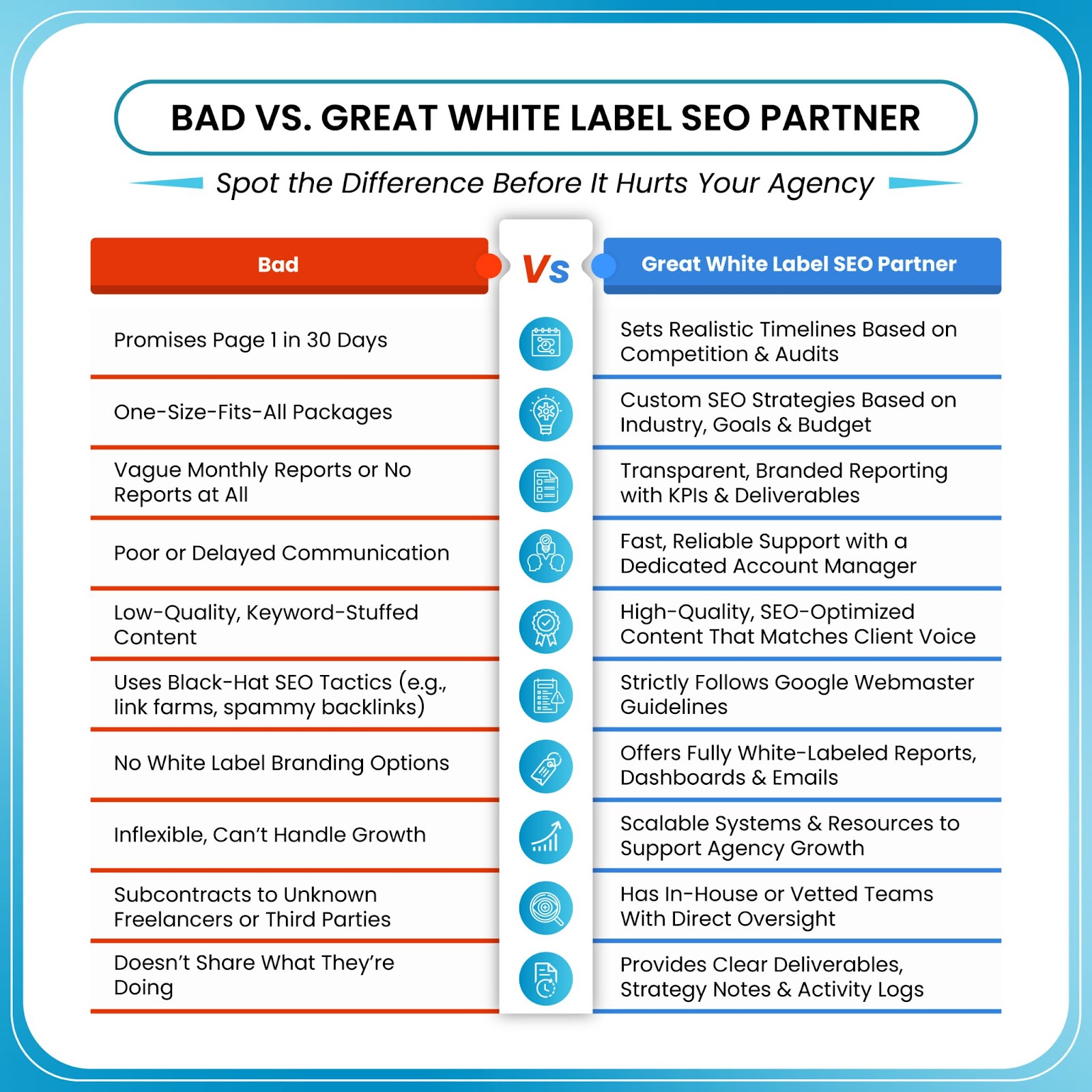
Essential Questions to Ask Potential Partners
1. Strategy and Methodology Questions
Before committing to any white label SEO company, ask detailed questions about their approach and methodologies. Request information about their keyword research process, content creation strategies, and link-building techniques. Quality providers should readily explain their processes and provide examples of successful implementations.
Ask about their approach to technical SEO, including site speed optimization, mobile responsiveness, and crawlability improvements. Understanding their methodology helps you evaluate whether their approach aligns with your quality standards and client expectations.
Inquire about their content creation process and whether they employ native English speakers for content development. Poor quality content can harm SEO efforts and damage client relationships, making this a crucial consideration.
2. Reporting and Communication
Discuss reporting frequency, format, and level of detail. Determine whether reports are automated or include human analysis and recommendations. Quality partners provide regular, comprehensive reports that demonstrate progress and identify improvement opportunities.
Ask about communication protocols for urgent issues or client concerns. Understand escalation procedures and expected response times for different types of requests. Clear communication expectations prevent misunderstandings and ensure smooth operations.

Inquire about client portal access and whether you can provide clients with direct access to certain reports or dashboards. This transparency can strengthen client relationships and reduce your administrative burden.
3. Scalability and Flexibility
Evaluate the provider's ability to scale services as your agency grows. Discuss their capacity to handle increased client loads and whether they can adapt to changing client needs. Scalable partners support your agency's growth without compromising service quality.
Ask about their flexibility in customizing services for different client types or industries. Understanding their adaptability helps you determine whether they can meet diverse client needs effectively.
Discuss contract terms and flexibility for adjusting service levels based on client requirements or budget changes. Flexible partners make it easier to maintain client relationships during changing circumstances.
Due Diligence Best Practices
1. Reference Checks and Case Studies
Request detailed case studies that demonstrate successful outcomes for similar clients. Quality white label SEO partners should provide specific examples of improved rankings, increased traffic, and enhanced conversions. Analyze these case studies for relevance to your client base.
Contact references directly to discuss their experience with the provider. Ask about communication quality, results delivery, and overall satisfaction. Previous clients can provide valuable insights into the provider's strengths and potential weaknesses.
Verify case study claims through third-party tools when possible. Some providers may exaggerate results or present incomplete information. Independent verification helps ensure accuracy and builds confidence in the partnership.
2. Trial Periods and Pilot Projects
Consider starting with a trial period or pilot project to evaluate the provider's capabilities before committing to a long-term partnership. This approach allows you to assess their work quality, communication style, and results delivery without significant risk.
Define clear success metrics for the trial period, including specific deliverables and performance benchmarks. This objective evaluation helps you make informed decisions about continuing the agency-client relationship.
Use pilot projects to test the provider's ability to meet deadlines, follow instructions, and deliver quality work. These small-scale tests can reveal potential issues before they impact major client relationships.
3. Contract Terms and Service Level Agreements
Carefully review contract terms, paying particular attention to service level agreements (SLAs), termination clauses, and performance guarantees. Understand your rights and obligations under the agreement, as well as procedures for addressing performance issues.
Ensure the contract includes provisions for data ownership and client confidentiality. You should retain ownership of all work performed for your clients and have assurances about data security and privacy protection.
Discuss penalty clauses for missed deadlines or subpar performance. Quality providers should be willing to include reasonable penalties that protect your interests while maintaining realistic expectations.
Making the Right Choice
Selecting the right white label SEO partner requires careful evaluation of multiple factors beyond just pricing and service offerings. The ideal partner combines technical expertise, industry experience, transparent communication, and a commitment to ethical practices.
Take time to thoroughly vet potential partners through reference checks, trial periods, and detailed discussions about their methodologies. The investment in proper due diligence pays dividends through stronger client relationships, better results, and reduced risk exposure.
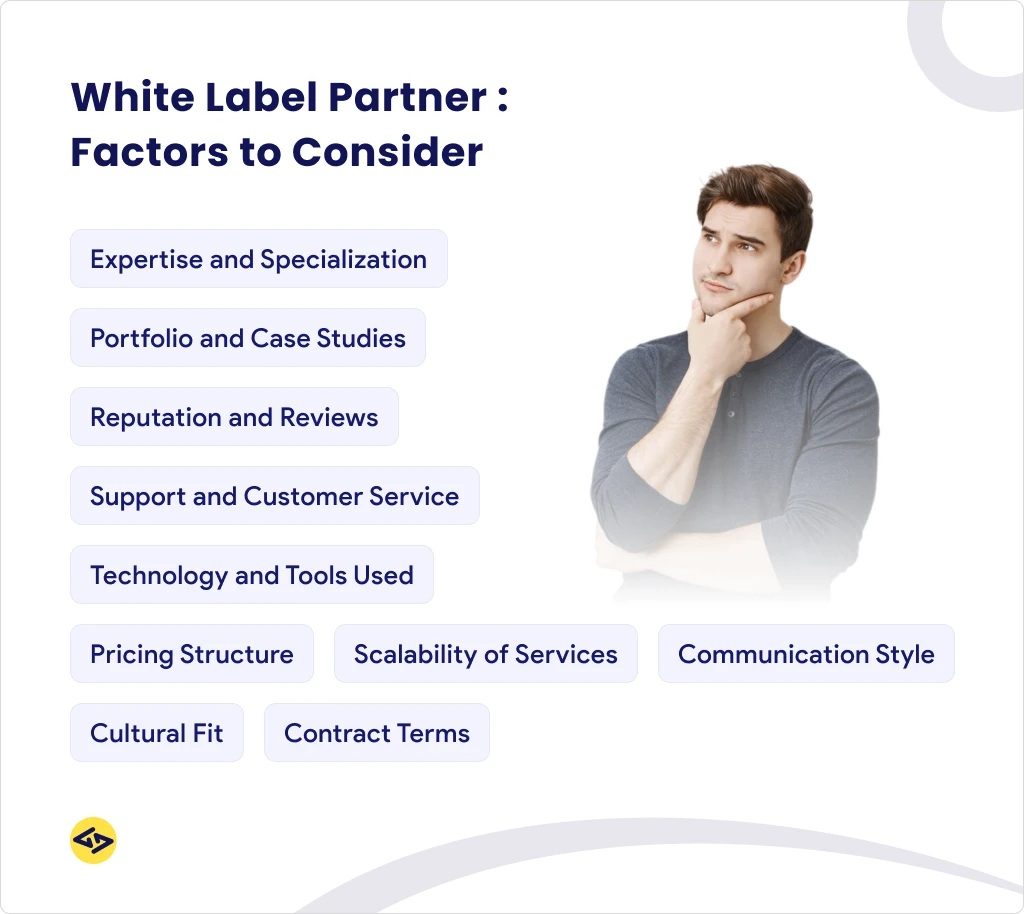
Image Source: iCoderz
Remember that the cheapest option rarely provides the best value. Focus on partners who demonstrate consistent results, ethical practices, and the ability to scale with your agency's growth. Quality white label SEO services represent an investment in your agency's future success.
Building Long-Term Partnership Success
The most successful white label SEO partnerships extend beyond simple vendor relationships. Look for partners who view themselves as extensions of your team and demonstrate genuine interest in your clients' success. These collaborative relationships produce better results and create more sustainable business models.
Establish regular communication schedules and performance review processes to ensure the partnership continues meeting your needs. Address issues promptly and maintain open dialogue about changing requirements or market conditions.
Consider the provider's investment in ongoing education and industry developments. SEO evolves rapidly, and partners who stay current with SEO best practices and algorithm changes provide better long-term value.
or support to help you field technical questions, while others prefer to remain completely invisible to your clients.
Why DashClicks is the Ultimate Partner for White Label SEO Services
When it comes to white label SEO services, DashClicks is more than just a provider – it’s a partner designed to help agencies thrive. Here's why partnering with DashClicks is a smart choice for growing your business:
- Transparency You Can Trust: DashClicks is built on a foundation of transparency, ensuring you and your clients are always in the loop. Their platform provides detailed, easy-to-understand reports and analytics, allowing you to showcase measurable results with confidence. This transparency helps build trust with your clients while strengthening your reputation as a dependable agency.
- Efficiency That Saves Time: Managing SEO campaigns can be complex and time-consuming. They simplify this through its robust, user-friendly platform designed to streamline workflows. You can manage multiple campaigns effortlessly, leaving you with more time to focus on scaling your agency and serving clients effectively.
- Cutting-Edge Tools and Resources: With DashClicks, you gain access to advanced tools and resources that elevate your SEO campaigns. From keyword research and website audits to tracking rankings and optimizing strategies, their platform is equipped with everything you need to deliver exceptional results.
- Dedicated Support That Has Your Back: Not only do you receive top-tier tools, but they also offer a dedicated support team ready to assist you at every step. Whether you’re handling client inquiries or facing roadblocks, their team is there to ensure you have everything you need to succeed.
- Focus on Growth, Not Technicalities: By partnering with white label SEO services provider, you can delegate the technical complexities of SEO to an experienced and trusted team. This allows you to channel your energy into expanding your client base, refining your services, and driving revenue growth.
DashClicks isn’t just a service provider—it’s an enabler of success for agencies looking to scale with confidence. With their transparent processes, advanced tools, and reliable support, you can deliver consistent results to your clients while focusing on what matters most: growing your business.
Frequently Asked Questions
Q1. How Do I Evaluate a White Label SEO Company’s Technical Capabilities?
Ans. Request detailed information about their technical SEO processes, including site audit procedures, page speed optimization techniques, and mobile responsiveness improvements. Ask for examples of technical improvements they've implemented and their results. Quality providers should demonstrate proficiency with industry-standard tools and current best practices.
Q2. What Should I Expect in Terms of Reporting from SEO White Label Services?
Ans. Comprehensive reporting should include keyword rankings, organic traffic growth, backlink profiles, technical audit results, and competitive analysis. Reports should be branded with your agency's logo and provide actionable insights rather than just raw data. Monthly reporting is standard, with some providers offering more frequent updates for critical metrics.
Q3. How Long Should I Expect to See Results from a White Label SEO Partner?
Ans. Legitimate SEO results typically begin appearing within 3-6 months, with more significant improvements visible after 6-12 months. Be wary of partners promising immediate results or dramatic improvements within the first month. Sustainable SEO requires time to build authority and trust with search engines.
Q4. What Are the Typical Contract Terms for White Label SEO Partnerships?
Ans. Most white label SEO companies offer month-to-month agreements or annual contracts with better pricing. Look for contracts that include clear service level agreements, performance metrics, and termination clauses. Avoid providers requiring long-term commitments without trial periods or performance guarantees.
Q5. How Do I Handle Client Questions About SEO Work Performed by My White Label Partner?
Ans. Maintain regular communication with your white label partner to stay informed about ongoing work and results. Request detailed reporting that you can confidently discuss with clients. Some providers offer training or support to help you field technical questions, while others prefer to remain completely invisible to your clients.
Your Next Steps for SEO Success
Choosing the right white label SEO partner is crucial for your agency's growth and client satisfaction. By avoiding these red flags and conducting thorough due diligence, you can build profitable partnerships that deliver consistent results.
Start by creating a detailed evaluation framework that includes the criteria discussed in this guide. Use this framework to objectively assess potential partners and make informed decisions based on facts rather than sales presentations.
Remember that the best white label SEO partnerships are built on trust, transparency, and shared commitment to client success. Take the time to find partners who align with your values and quality standards—your clients and your agency's reputation depend on it.
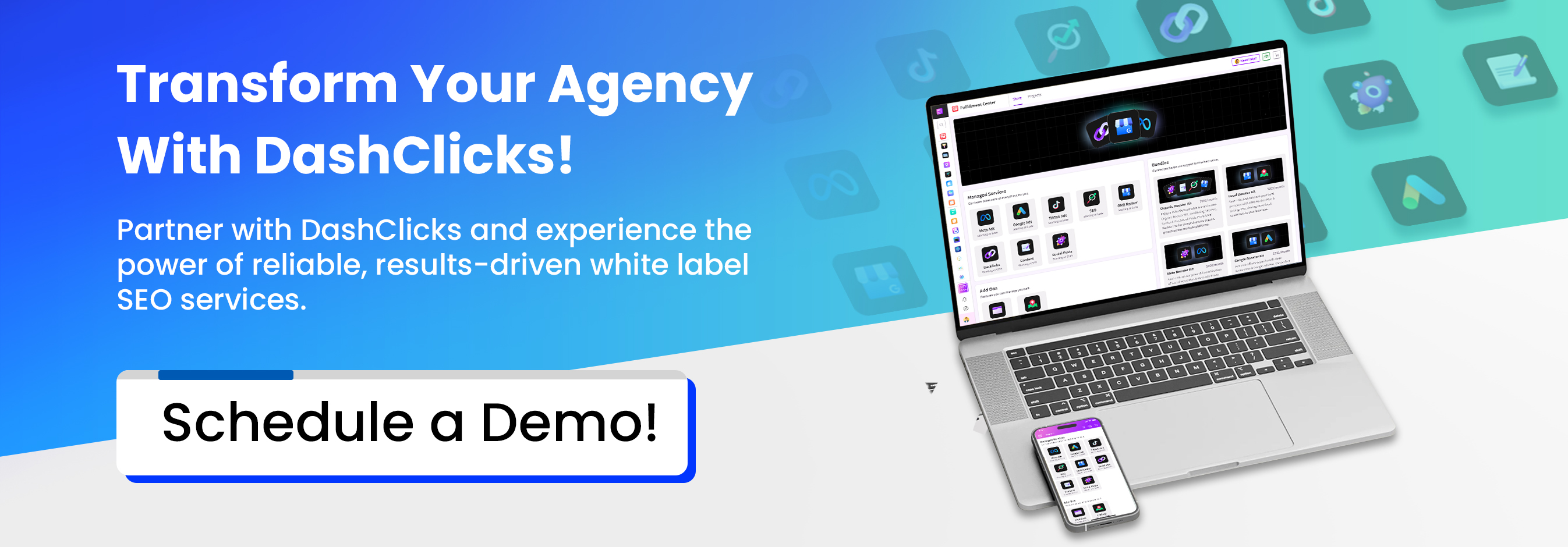

From 5 to 50 Clients: Scaling Strategies Using SEO Reselling
Growing from a handful of clients to dozens isn't just about working harder—it's about working smarter. SEO reselling offers agencies and entrepreneurs a proven path to scale without the overhead of building an entire SEO team from scratch.
The digital marketing industry is experiencing unprecedented growth, with the global SEO services market expected to reach $103,236.2 million by 2025. This surge creates massive opportunities for resellers who understand how to effectively leverage white-label SEO services.
But scaling isn't automatic. It requires strategic planning, smart partnerships, and proven systems that can handle growth without compromising quality. This guide reveals the exact strategies successful resellers use to multiply their client base while maintaining profitability.
Understanding the SEO Reselling Landscape
SEO reselling involves partnering with established SEO agencies to deliver services under your brand name. You handle client relationships and sales while your partner manages the technical execution. This model allows agencies to offer comprehensive SEO services without hiring specialists or investing in expensive tools.
The reselling market has matured significantly. According to industry data, 73% of agencies now offer some form of white-label services, compared to just 41% five years ago. This growth reflects the increasing demand for specialized digital marketing services and the challenges of building in-house expertise.
Key Market Drivers
Several factors fuel the SEO reseller program:
- Rising SEO Demand: Small and medium businesses increasingly recognize SEO's importance. BrightLocal's 2024 survey found that 86% of local businesses invest in SEO, up from 74% in 2020.
- Skill Gap Reality: Building an effective SEO team requires expertise in technical SEO, content marketing, link building, and analytics. Many agencies struggle to find qualified professionals—the average time to fill an SEO specialist position is 68 days.
- Cost Efficiency: Hiring a senior SEO specialist costs $65,000-$95,000 annually, plus benefits and tools. Reseller partnerships often provide better ROI, especially for agencies handling fewer than 30 SEO clients.
- Client Expectations: Modern clients expect comprehensive digital marketing services. Agencies that can't deliver SEO risk losing clients to full-service competitors.
The 5-Client Foundation: Building Your Starting Point
Most successful SEO resellers begin with a small, manageable client base. This foundation phase is crucial for understanding client needs, refining processes, and establishing proof of concept.
A. Identifying Your Ideal Starting Clients
Your first five clients should share certain characteristics that make them ideal for testing and refining your reselling model:
- Local Businesses With Clear Needs: Restaurants, dental practices, law firms, and home service companies often have straightforward SEO requirements and can see results quickly.
- Existing Relationships: Current clients who trust your expertise are more likely to try new services. They're also more forgiving during the initial learning phase.
- Budget Capacity: Focus on clients who can afford $1,500-$3,000 monthly for SEO services. This range allows for meaningful work while providing reasonable margins.
- Growth Potential: Choose clients in expanding markets or those planning business growth. Their success creates case studies and referral opportunities.
B. Setting Up Your Initial Systems
Before taking on your first SEO reseller clients, establish these foundational systems:
- Client Onboarding Process: Develop a standardized approach for gathering client information, setting expectations, and defining success metrics. This includes technical audits, competitor analysis, and goal-setting sessions.
- Communication Framework: Establish regular reporting schedules, preferred communication channels, and escalation procedures. Many resellers use client portals for transparency and self-service access.
- Performance Tracking: Implement systems for monitoring rankings, traffic, and conversions. Tools like Google Analytics, Search Console, and rank tracking software are essential.
- Quality Assurance: Create checkpoints for reviewing work before client delivery. This includes content approval, technical audit verification, and campaign performance analysis.
Strategic Partnerships: Choosing Your SEO Provider
Your reselling success depends heavily on your SEO partner's capabilities, reliability, and alignment with your business goals. The wrong partnership can damage agency-client relationship and limit growth potential.
A. Essential Partner Qualifications
- Technical Expertise: Your partner should demonstrate proficiency in technical SEO, content marketing, link building, and local SEO. Request case studies showing measurable results across different industries.
- Scalability: Can they handle your growth? Partners should have systems for managing increased workload without compromising quality. Ask about their current client capacity and team size.
- Reporting Capabilities: Look for partners who provide detailed, branded reports you can share with clients. White-label reporting tools should include rankings, traffic data, and clear explanations of work completed.
- Communication Standards: Your partner should respond promptly to questions and provide regular updates on campaign progress. Establish clear communication protocols upfront.
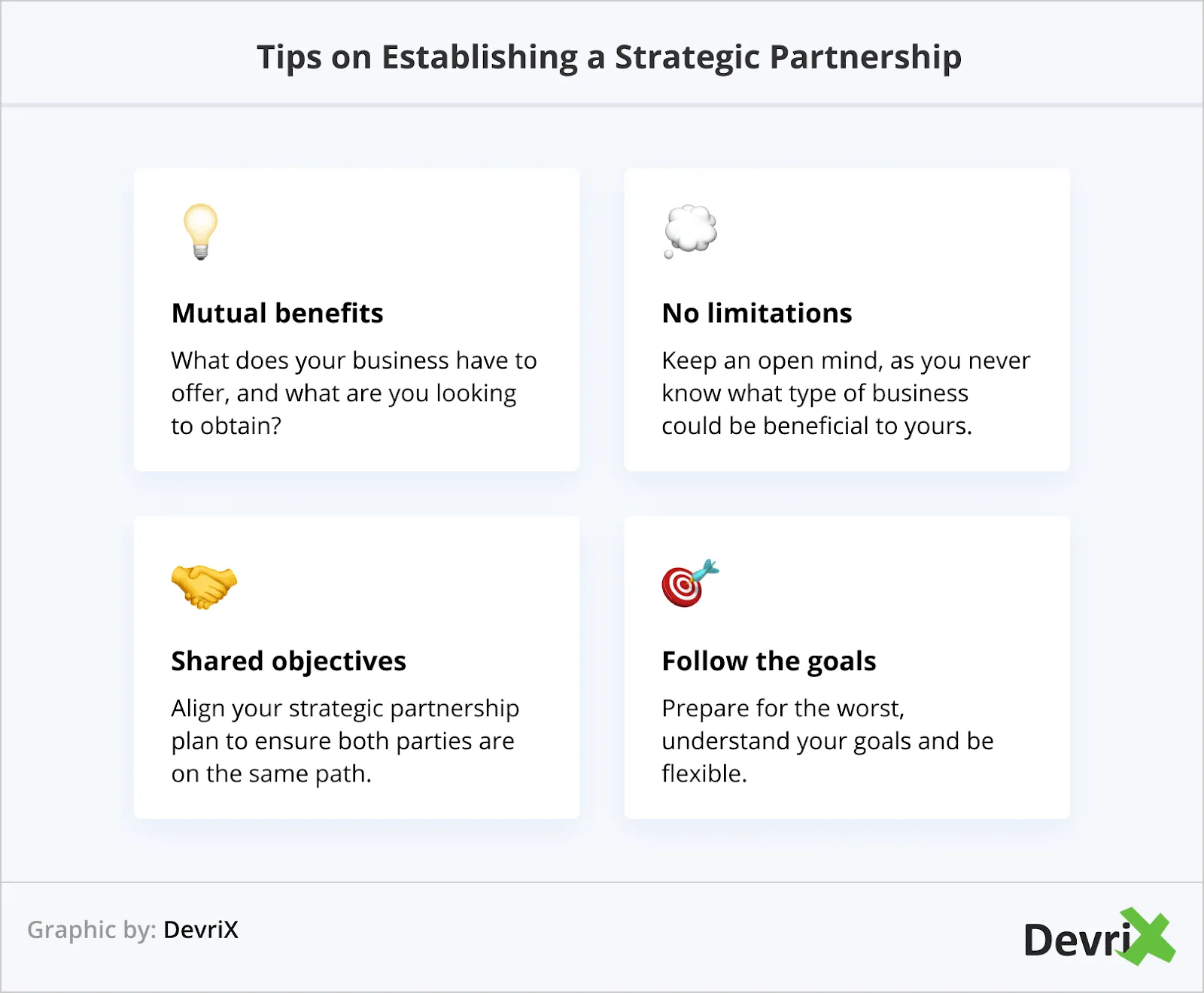
Image Source: DevriX
B. Red Flags to Avoid
- Guaranteed Rankings: No legitimate SEO provider can guarantee specific rankings. Google's algorithm changes make such promises impossible to fulfill.
- Lack of Transparency: Partners who won't explain their methods or provide detailed reporting create risks for your client relationships.
- Unrealistic Timelines: SEO results typically take 4-6 months to materialize. Partners promising immediate results likely use risky techniques.
- Poor Communication: Delayed responses, unclear explanations, or unwillingness to participate in client calls indicate potential problems.
The 10-Client Milestone: Systematizing Operations
Moving from 5 to 10 clients requires operational improvements and system refinements. This phase tests your ability to maintain quality while handling increased complexity.
A. Process Optimization
- Standardized Workflows: Document every step of your SEO delivery process. This includes client onboarding, monthly reporting, strategy development, and performance reviews.
- Automation Tools: Implement tools for automating routine tasks like report generation, rank tracking, and client communications. Popular options include SEMrush, Ahrefs, and white-label reporting platforms.
- Quality Control Systems: Establish review processes for all client deliverables. This might include content approval workflows, technical audit verification, and campaign performance analysis.
- Client Segmentation: Group clients by industry, service level, or complexity. This allows for more efficient resource allocation and specialized expertise development.
B. Team Development
Even with outsourced SEO services, you'll need internal support for client management, communication, and business development.
- Client Success Manager: Hire someone dedicated to client communication, reporting, and relationship management. This role is crucial for maintaining satisfaction as you scale.
- Business Development: As you prove SEO reselling success, invest in dedicated sales resources to accelerate growth. This might be a full-time salesperson or outsourced business development services.
- Project Management: Implement project management software and processes to coordinate between your team, clients, and SEO partners. Tools like DashClicks can help track progress and deadlines.
Scaling to 25 Clients: Advanced Growth Strategies
The jump from 10 to 25 clients represents a significant business transformation. You're moving from a small operation to a substantial revenue stream that requires more sophisticated management approaches.
A. Service Diversification
1. Tiered Service Offerings: Develop multiple service levels to accommodate different client budgets and needs. This might include:
- Basic SEO ($1,500/month): Local SEO, basic content, technical optimization.
- Standard SEO ($3,000/month): Comprehensive SEO, content marketing, link building.
- Premium SEO ($5,000+/month): Advanced strategies, competitor analysis, conversion optimization.
Here is an example -

2. Industry Specialization: Focus on specific industries where you can develop deep expertise. Specialized knowledge allows for premium pricing and more effective marketing.
3. Additional Services: Expand beyond SEO to include complementary services like PPC management, social media marketing, or web design. This increases client lifetime value and reduces churn.
B. Marketing and Sales Optimization
- Content Marketing Strategy: Develop a robust content marketing program showcasing your SEO expertise. This includes blog posts, case studies, webinars, and industry speaking opportunities.
- Referral Programs: Implement formal referral programs for existing clients. Satisfied clients are your best source of new business—make it easy for them to refer others.
- Partnership Development: Build relationships with complementary service providers like web designers, marketing consultants, and business coaches. These partnerships can provide steady referral streams.
- Sales Process Refinement: Develop a structured sales process with defined stages, qualification criteria, and conversion metrics. This allows for predictable growth and improved close rates.
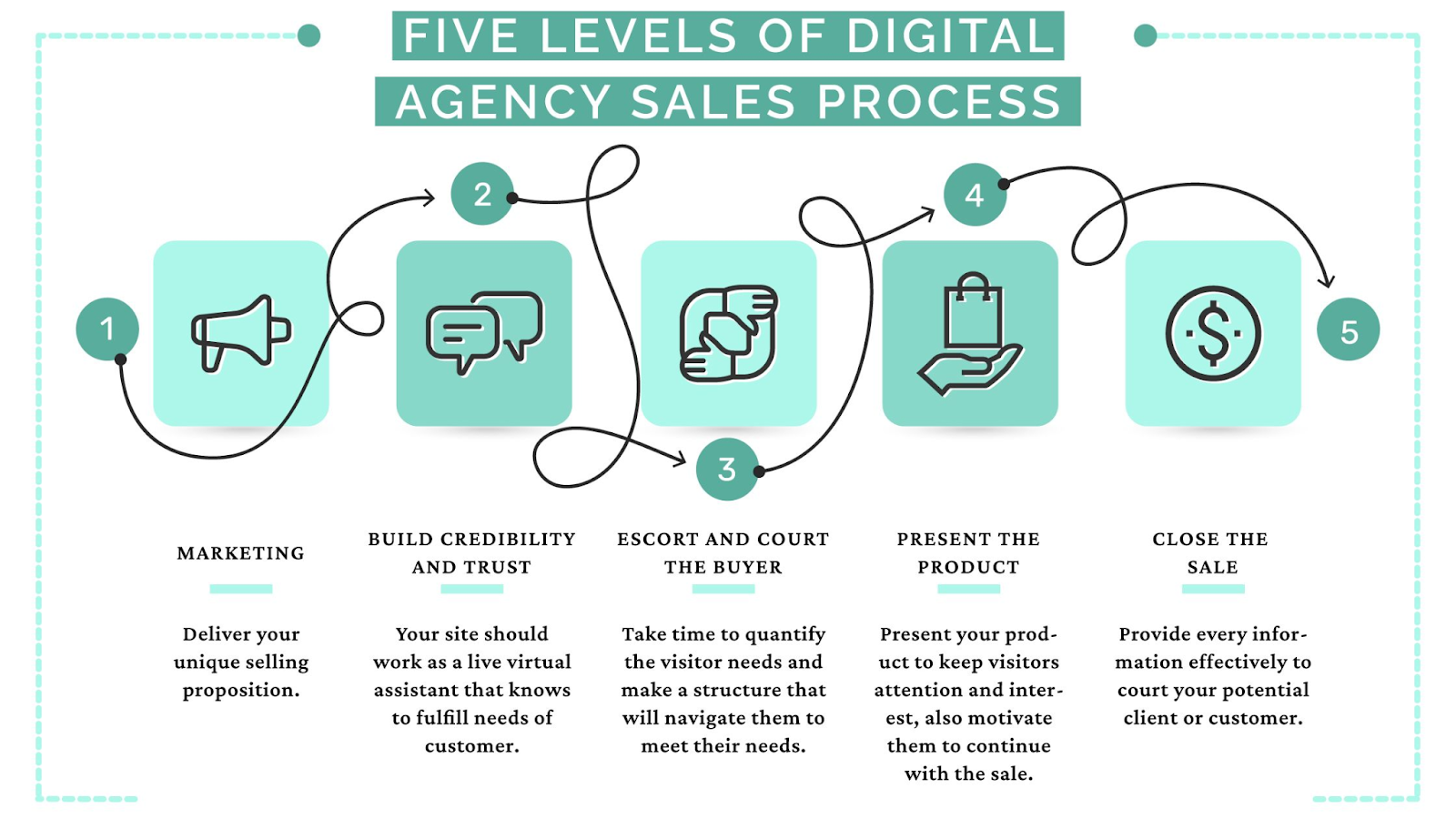
C. Technology and Infrastructure
- CRM Implementation: Invest in a robust CRM software to manage client relationships, track sales opportunities, and monitor client satisfaction. Popular options include DashClicks, HubSpot, Salesforce, or Pipedrive.
- Financial Management: Implement proper accounting systems for tracking revenue, expenses, and profitability by client. This data is crucial for making informed business decisions.
- Performance Analytics: Develop comprehensive dashboards for monitoring business performance, client results, and operational efficiency. This includes client retention rates, average client value, and team productivity metrics.
Reaching 50 Clients: Operational Excellence
Managing 50 SEO clients requires sophisticated systems, skilled team members, and exceptional operational discipline. This scale represents a significant business milestone with substantial monthly recurring revenue.
A. Advanced Team Structure
1. Department Specialization: Organize your team into specialized departments:
- Client Success: Dedicated to client communication and satisfaction.
- Business Development: Focused on new client acquisition.
- Operations: Managing relationships with SEO partners and internal processes.
- Finance and Administration: Handling contracts, billing, and business operations.
2. Training and Development: Invest in ongoing team training to maintain service quality and stay current with industry trends. This includes SEO education, client service training, and business development skills.
3. Performance Management: Implement clear performance metrics and regular review processes. This ensures team members understand expectations and provides opportunities for professional development.
B. Client Retention Strategies
At 50 clients, retention becomes more critical than acquisition. Losing clients at this scale can significantly impact revenue and profitability.
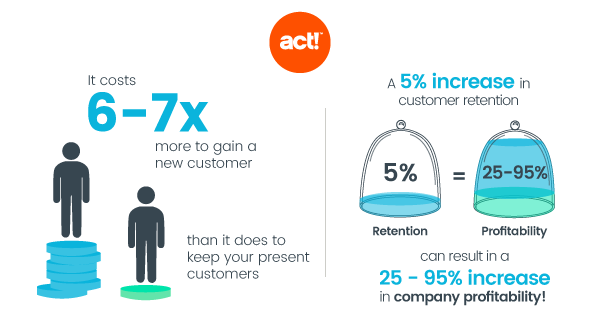
Image Source: Act
- Proactive Communication: Implement systems for proactive client communication, including regular check-ins, performance reviews, and strategic planning sessions.
- Value Demonstration: Develop sophisticated reporting and analysis tools that clearly demonstrate ROI and business impact. Clients who understand their return on investment are less likely to churn.
- Service Excellence: Maintain high service standards through quality assurance processes, regular training, and client feedback systems.
- Upselling Opportunities: Identify opportunities to expand services with existing clients. This might include additional service lines, increased service levels, or new business locations.
C. Financial Management and Profitability
- Revenue Optimization: Analyze client profitability and identify opportunities for pricing optimization or service efficiency improvements.
- Cost Management: Monitor and control costs associated with SEO partner services, team salaries, and technology tools. Look for economies of scale as you grow.
- Cash Flow Management: Implement robust invoicing and collection processes to maintain healthy cash flow. Consider offering annual payment discounts to improve cash flow predictability.
- Growth Investment: Allocate resources for continued growth, whether it's investing in new technology or expanding your team. Be strategic and prioritize investments that will have the greatest impact on your business.
- Client Retention: Don't neglect your current customers while focusing on acquiring new ones. Implement strategies to retain existing customers, such as offering loyalty programs or personalized communication.
- Partnerships and Collaborations: Consider forming partnerships or collaborations with other businesses in the industry to expand your reach and offer complementary services. This can help you tap into new markets and benefit from each other's expertise.
- Continuous Improvement: Always be on the lookout for ways to improve and optimize your processes, whether it's through adopting new technology, streamlining workflows, or implementing customer feedback. A continuous improvement mindset will help you stay competitive and provide the best possible products or services to your customers.
Enterprise-Level Systems and Processes
Scaling sustainably requires more than great talent—it needs robust systems that support growth without compromising efficiency or quality.
● Project Management at Scale: Scaling means juggling multiple projects, teams, and deadlines. Implement enterprise-level tools like DashClicks to streamline operations. Use customized workflows, agency automation processes, and cross-functional collaboration to ensure every task is on track and your entire team is aligned on priorities. These tools can also provide valuable insights into productivity and help identify bottlenecks early.
● Standard Operating Procedures (SOPs): Consistency is key to delivering high-quality work at scale. Every repeatable task, from onboarding new clients to campaign execution, should be documented and optimized. SOPs reduce the risk of human error, maintain brand consistency, and provide a clear framework for training new team members. This becomes especially crucial as your agency grows and your team expands.
● Client Lifecycle Automation: The client journey, from onboarding to offboarding, can be full of repetitive tasks that eat up time. Automating as much of this process as possible—without sacrificing personalization—frees up your team to focus on delivering value. Use tools like DashClicks to streamline communication, handle follow-ups, and ensure no step is missed, resulting in a seamless client experience.
Culture of Continuous Improvement
When your agency hits the milestone of 50 clients, it’s easy for complacency to sneak in. However, operational excellence isn’t a one-time achievement—it’s an ongoing commitment. The difference between surviving and thriving at this stage lies in fostering a culture of continuous improvement.
● Conduct Regular Performance Audits: Evaluate your team’s output, your reselling partner’s contributions, and client results on a regular basis. Identify gaps and areas for improvement, ensuring your agency delivers consistent results while staying ahead of industry trends.
● Review Churn Cases: Losing clients provides an opportunity to learn. Dive into churn cases to understand what went wrong, and use that feedback to fine-tune your processes and improve client satisfaction. Build systems to gather regular feedback from clients to prevent churn before it happens.
● Foster a Growth Culture: Encourage your team to embrace innovation, training, and process optimization as part of their daily routines. Create spaces for collaboration and reward employees who bring fresh ideas to the table or find ways to improve efficiency. A culture of learning and growth keeps your agency adaptive and competitive.
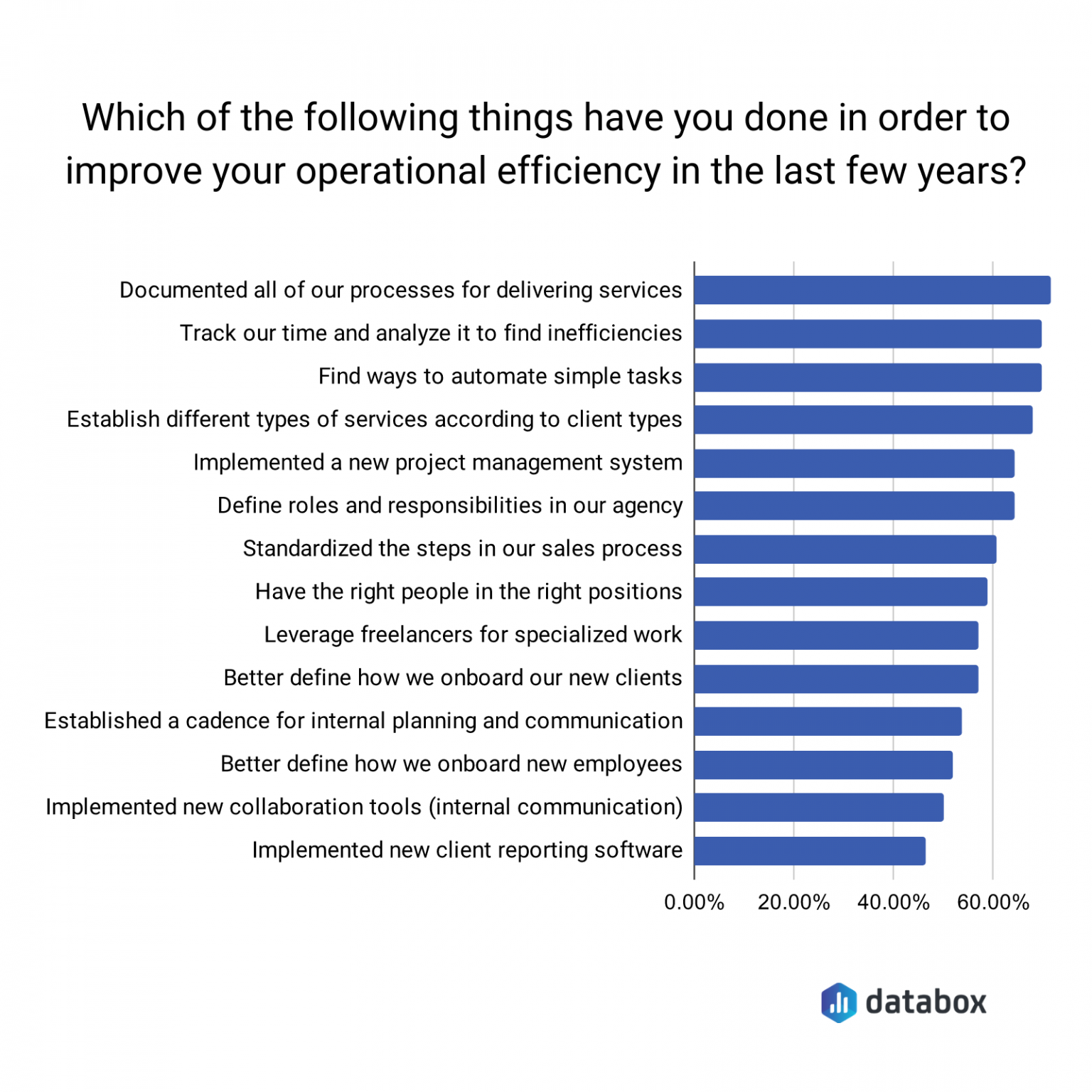
Image Source: Databox
What Comes After 50?
Reaching 50 clients isn’t the finish line—it’s the launchpad for new opportunities. At this stage, you’re in a position to expand in ways that can take your agency to the next level.
- Expand into New Verticals or Geographies: Leverage your expertise to tap into untapped markets or industries. With the right planning, new verticals or geographic expansions can open up significant revenue streams.
- Launch Franchise-Style Agency Branches: If your processes and systems are rock-solid, consider franchising your agency model. This allows you to scale your brand while maintaining consistency in service delivery.
- Develop Proprietary Tech or Tools: Differentiate yourself from competitors by building proprietary technology or tools that add unique value to your service offering. This could include client dashboards, analytics platforms, or even AI-driven solutions.
- Build Thought Leadership: Establish yourself as a leader in your space through podcasts, webinars, workshops, and speaking engagements. Sharing your expertise not only strengthens your brand but also helps attract clients and top-tier talent.
To scale beyond this milestone, your backend systems must be airtight. This demands reliable tools, efficient processes, and a culture of continuous improvement. With the right infrastructure in place, there’s no limit to what your agency can achieve—and a partner like DashClicks can help you get there faster and more effectively.
Why DashClicks Is the Perfect SEO Reselling Partner?
At this point in your growth journey, success hinges on two things: consistency in delivery and scalability in operations. That’s where a partner like DashClicks becomes indispensable.
DashClicks offers a complete white-label ecosystem tailored for agencies aiming to grow fast without compromising quality. Their SEO reseller services are backed by industry-best practices, transparent reporting, and dedicated fulfillment teams that know what it takes to get real results.
Here’s what you can expect with DashClicks:
- Prebuilt, high-converting SEO packages that cover everything from local SEO to advanced national campaigns.
- A white-labeled dashboard that keeps your clients engaged and informed at all times.
- InstaSites and InstaReports tools to boost your agency’s outreach and lead nurturing.
- Fast, responsive support to back your client-facing team.
- A dedicated SEO fulfillment team so you can focus on sales and scaling—not operations.
Whether you’re just getting started or already managing dozens of SEO clients, the agency is built to grow with you. Their platform gives you the infrastructure of a full-scale agency, without the overhead.
Ready to Go from 5 to 50 Clients?
Scaling your SEO reselling business doesn’t have to be overwhelming. With the right strategies, systems, and support, you can build a thriving agency that runs like a machine and delivers real results for your clients.
If you're ready to stop doing everything yourself and start growing your client base the smart way, it's time to partner with a proven SEO fulfillment provider.
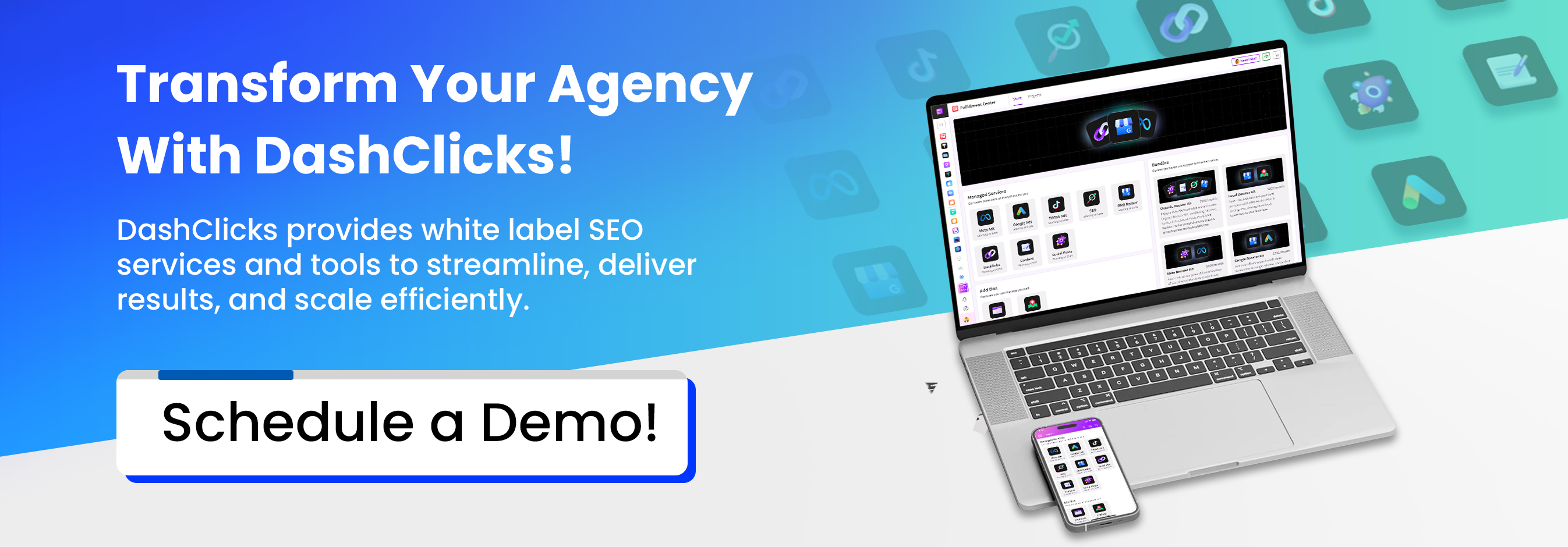

White Label SEO vs. In-House SEO: Which Path Leads to Success?
Agencies face a critical decision that can make or break their growth trajectory: should they build an in-house SEO team or partner with white label SEO services? This choice impacts everything from profit margins to client satisfaction rates.
The SEO industry generates over $80 billion annually, with agencies scrambling to capture their share. Yet many struggle with resource allocation, expertise gaps, and scaling challenges. Understanding the fundamental differences between white label and in-house SEO approaches will help you make the strategic decision that aligns with your agency's goals.
This comprehensive guide breaks down both models, examining costs, benefits, and real-world applications to help you choose the path that drives maximum results for your clients and your bottom line.
Understanding White Label SEO Services
White label SEO services allow agencies to outsource SEO work to specialized providers while maintaining their brand identity with clients. Think of it as having an invisible SEO department that works behind the scenes. In fact, according to HubSpot, 89% of marketers say SEO is a successful strategy for their business.
How White Label SEO Works?
A white label SEO company handles the technical execution while your agency manages client relationships. The process typically involves:
- Strategy Development: The white label provider creates customized SEO strategies based on your client's needs.
- Implementation: Technical SEO, content creation, and link building happen under your agency's brand.
- Reporting: Detailed reports arrive branded with your agency's logo and information.
- Communication: You remain the primary contact point for clients.
Key Benefits of White Label SEO Services
- Instant Expertise Access: White label providers employ specialists in technical SEO, content marketing, and link building. You gain access to expert-level knowledge without the hiring challenges.
- Scalability: Handle multiple clients simultaneously without expanding your team. White label partners can accommodate sudden growth spurts or seasonal demands.
- Cost Efficiency: Avoid salary expenses, benefits, training costs, and software subscriptions. Pay only for delivered services.
- Faster Market Entry: Launch SEO services immediately instead of spending months building internal capabilities.
- Risk Reduction: Established white label providers have proven processes and track records, reducing the risk of client dissatisfaction.
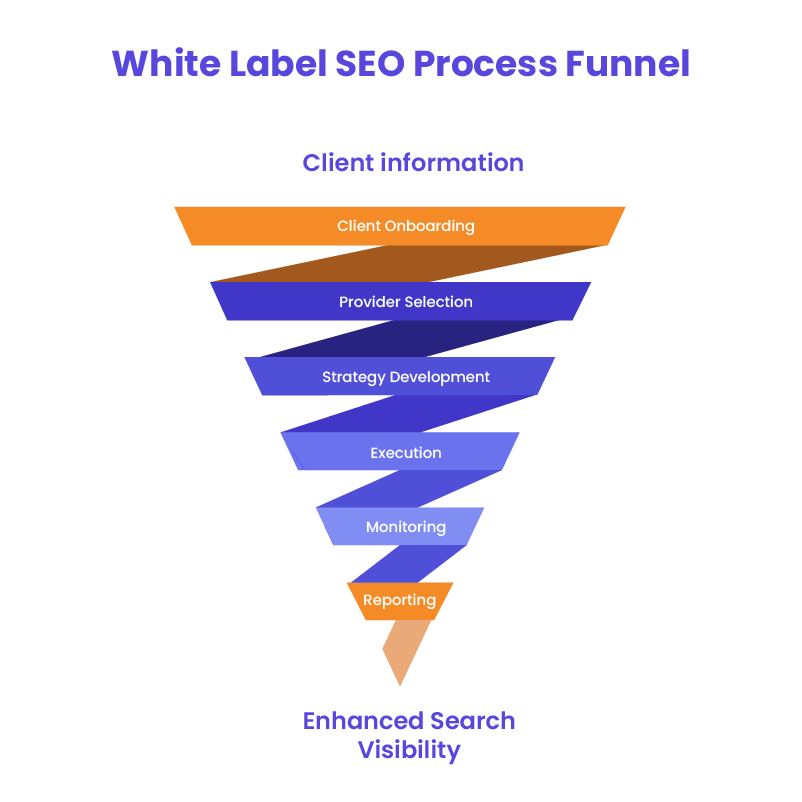
Image Source: White Label Agency
The In-House SEO Approach
In-house SEO involves building an internal team of SEO specialists who work exclusively for your agency. This approach offers direct control over every aspect of your SEO operations.
Building Your In-House SEO Team
Creating an effective in-house SEO team requires strategic planning and significant investment:
Essential Roles:
- SEO Manager or Director
- Technical SEO Specialist
- Content Marketing Specialist
- Link Building Specialist
- SEO Analyst
Infrastructure Requirements:
- Premium SEO tools
- Project management systems
- Reporting software
- Training and development programs
Advantages of In-House SEO
- Complete Control: Direct oversight of strategies, implementation, and quality standards. Make real-time adjustments without external coordination.
- Deep Client Understanding: In-house teams develop intimate knowledge of each client's business, industry, and unique challenges.
- Brand Alignment: Your team fully understands your agency's values, processes, and client service standards.
- Long-Term Investment: Building internal expertise creates lasting value for your agency.
- Profit Retention: Keep all revenue generated from SEO services instead of sharing with external providers.
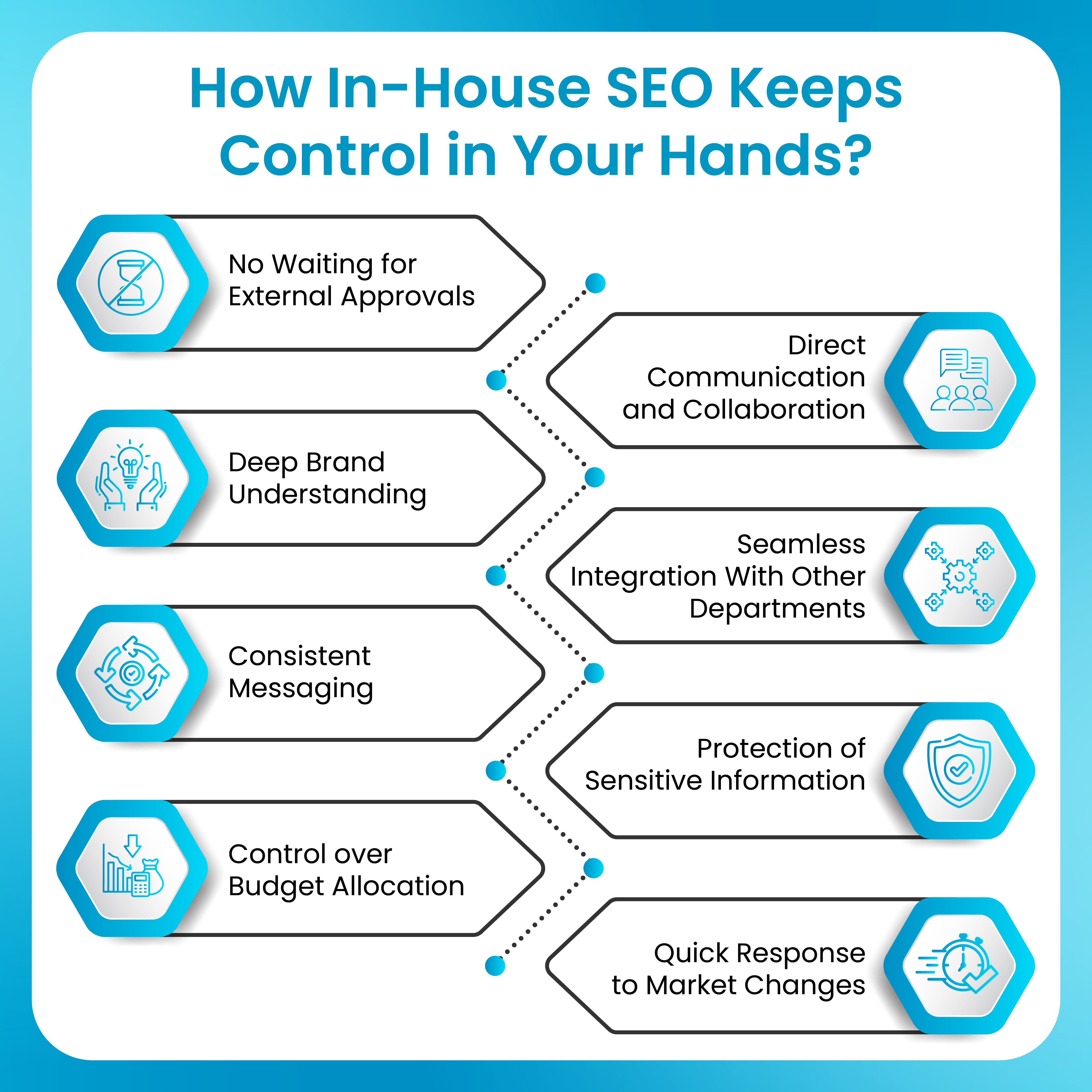
Cost Analysis: White Label vs. In-House
White Label SEO Costs
White label SEO services typically charge between $500-$2,000 per client monthly, depending on service scope and complexity. Additional considerations include:
- Setup Fees: $200-$500 per new client
- Custom Reporting: $50-$200 monthly
- Rush Projects: 20-50% premium rates
- Scaling Costs: Linear increase with client volume
In-House SEO Investment
Building an in-house SEO team requires substantial upfront and ongoing investment:
Annual Salary Costs:
- SEO Manager: $70,000-$120,000
- Technical SEO Specialist: $60,000-$100,000
- Content Specialist: $45,000-$75,000
- Link Building Specialist: $40,000-$70,000
Additional Expenses:
- Benefits (30% of salaries)
- SEO tools: $500-$2,000 monthly
- Training: $5,000-$15,000 annually
- Office space and equipment
Total First-Year Investment: $200,000-$400,000 for a basic team
Quality and Expertise Comparison
White Label SEO Quality Factors
- Specialization Advantage: White label companies focus exclusively on SEO, often developing superior expertise in specific areas.
- Industry Experience: Established providers have worked across multiple industries and verticals.
- Tool Access: Premium subscriptions to expensive SEO tools that might be cost-prohibitive for smaller agencies.
- Continuous Learning: Dedicated teams stay current with algorithm updates and industry changes.
In-House SEO Quality Considerations
- Learning Curve: New team members require time to reach peak performance levels.
- Knowledge Gaps: Difficult to hire specialists for every SEO discipline.
- Industry Updates: Requires ongoing training investment to maintain expertise.
- Resource Limitations: Smaller teams may struggle with complex technical challenges.
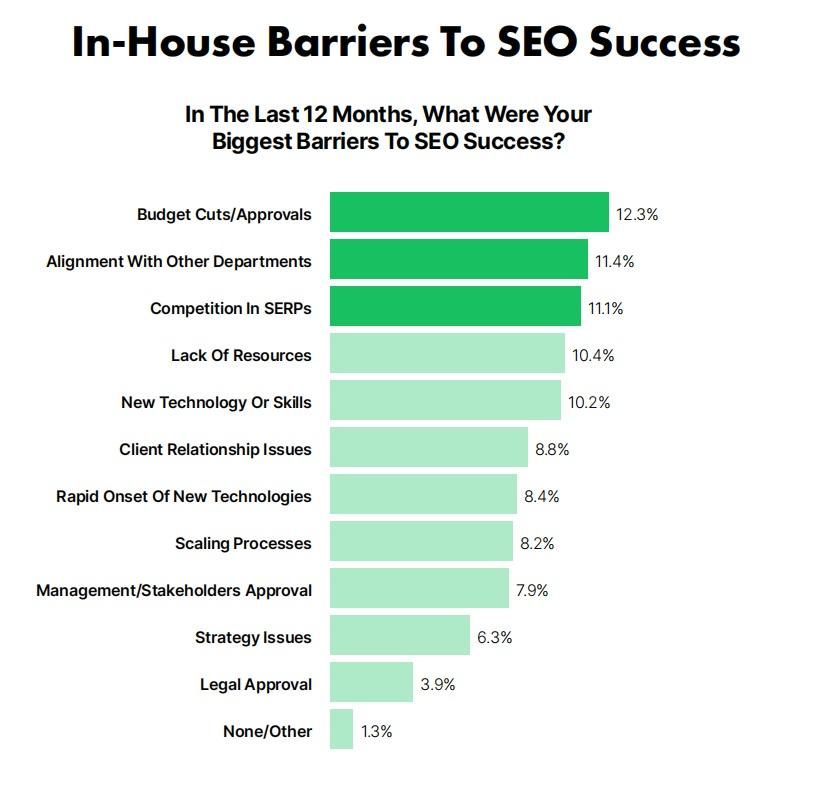
Image Source: Search Engine Journal
Scalability and Flexibility
White Label SEO Scalability
White label providers excel at handling rapid growth or seasonal fluctuations. They can:
- Onboard new clients within days.
- Adjust service levels based on demand.
- Handle multiple projects simultaneously.
- Provide backup coverage during peak periods.
In-House SEO Scaling Challenges
Internal teams face several scaling limitations:
- Hiring Delays: Finding qualified SEO professionals takes 3-6 months.
- Training Time: New hires need 6-12 months to reach full productivity.
- Fixed Costs: Salaries continue regardless of client volume.
- Capacity Constraints: Limited ability to handle sudden workload increases.
Client Satisfaction and Results
White Label SEO Performance
Success rates vary significantly among white label providers. Key performance indicators include:
- Average Ranking Improvements: 3-5 positions within 6 months.
- Organic Traffic Growth: 25-50% annually for established websites.
- Client Retention Rates: 80-90% for quality providers.
In-House SEO Outcomes
In-house teams often achieve strong results due to:
- Deep Client Relationships: Better understanding of business goals.
- Consistent Communication: Direct access to decision-makers.
- Customized Strategies: Tailored approaches for each client.
- Long-Term Focus: Ability to execute extended campaigns.
Making the Right Choice for Your Agency
When White Label SEO Services Work Best
1. Startup Agencies: For agencies just starting out, resources are often limited, and meeting immediate client demands can be challenging. White label SEO services allow startups to offer top-tier SEO without the need to hire in-house experts or invest heavily in tools and training. This enables them to focus on building their brand and acquiring clients.
2. Rapid Growth Phases: Agencies experiencing sudden expansion often struggle to keep up with the increased demand for services. White label providers can step in to handle the overflow, ensuring clients receive consistent, high-quality SEO services without the delays that come with hiring and training new staff.
3. Specialized Agencies: Agencies that focus on niche services like PPC, web design, or app development may not want to invest in building out a full SEO division. A white label SEO partner enables them to offer a broader range of services to their clients by leveraging the expertise of external providers without diverting resources from their core offerings.
4. Geographic Expansion: Agencies looking to enter new markets may find it challenging to build local expertise and expand their reach quickly. White label services can help them offer complete, localized SEO solutions without the need for significant upfront investment, making it easier to establish a presence in new regions.
When In-House SEO Makes Sense
1. Established Agencies: Agencies with stable revenue streams and a strong client base are often better positioned to build in-house SEO teams. This allows them to have more control over their strategies and align their services closely with their long-term growth goals. Investing in an internal team becomes a valuable asset as the agency scales.
2. Large Client Bases: Agencies managing more than 20 SEO clients monthly may find it cost-effective to build an internal team. At this scale, the high volume of work justifies the expense of hiring dedicated SEO professionals and purchasing the necessary tools, leading to better margins in the long run.
3. Premium Positioning: Agencies that target high-end clients and charge premium rates need to maintain direct control over the quality and delivery of their services. An in-house SEO team allows for greater oversight, customization, and the ability to build a reputation for excellence in the industry.
4. Strategic Focus: For companies that view SEO as a core competency rather than just an add-on service, building an in-house team makes sense. It enables them to develop unique strategies, innovate, and position themselves as leaders in the SEO space, setting them apart from competitors relying on outsourced solutions.
Hybrid Approach: Best of Both Worlds
Many successful agencies strategically combine in-house teams with white label support to maximize efficiency and flexibility:
1. Core Team + White Label Support: Keep in-house leadership and expertise to maintain control over strategy and client relationships while outsourcing specialized tasks like design, development, or paid media to trusted white label providers. This allows the agency to focus on its strengths while delivering a full-service experience.
2. Overflow Management: During peak periods, tight deadlines, or rapid growth phases, white label services can act as an extension of your team, ensuring no project is delayed and maintaining client satisfaction without the need to hire additional full-time staff.
3. Skill-Specific Partnerships: Some tasks, like technical SEO or website development, require niche expertise. By partnering with white label providers for these areas while managing content creation, strategy, and client communication internally, agencies can ensure high-quality execution without overextending their team’s capabilities.
4. Testing Ground: White label services are a great way to test new service offerings or gauge demand in specific areas before committing to hiring full-time staff or building internal teams. This approach allows agencies to scale thoughtfully and reduce risk.
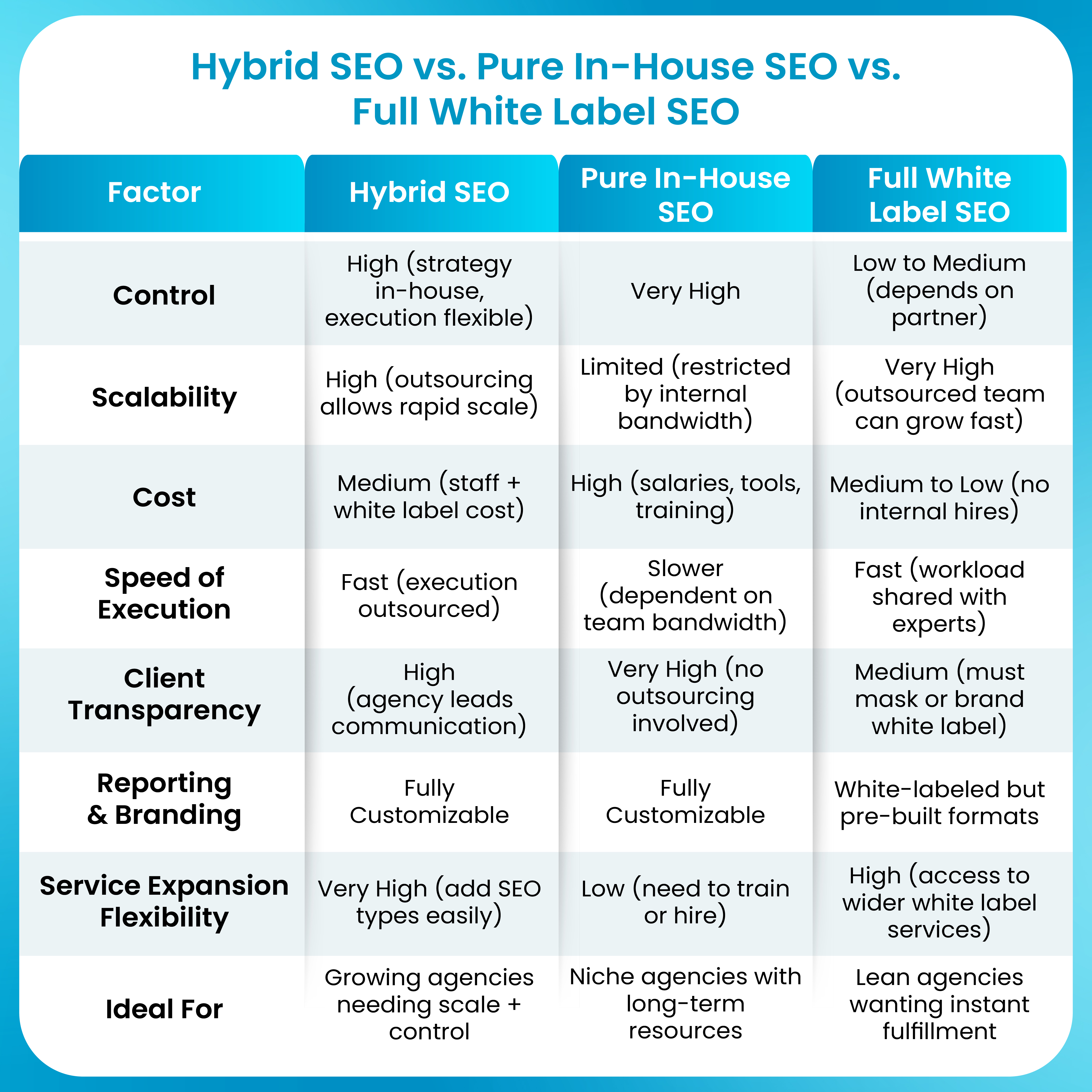
Future-Proofing Your SEO Strategy
The SEO landscape is constantly evolving, shaped by advancements like AI integration, voice search optimization, and mobile-first indexing. As these changes continue to redefine best practices, it’s crucial to consider key factors when choosing your approach to SEO strategy:
- Technology Adaptation: White label providers often invest in cutting-edge tools, software, and training at a faster pace than individual agencies. This means they can offer access to advanced analytics platforms, AI-driven keyword research, and automation tools that can enhance campaign effectiveness and save time.
- Algorithm Updates: Search engines frequently roll out algorithm changes, and staying on top of these updates is critical for maintaining rankings. Specialized white label providers typically have dedicated teams monitoring these updates, allowing them to quickly adapt strategies and minimize disruptions to your clients' SEO performance.
- Industry Trends: SEO trends are always shifting, from the rise of E-E-A-T (Expertise, Authority, Trustworthiness) to the growing importance of Core Web Vitals. Staying current with these trends requires focused effort and ongoing research, something white label companies are well-equipped to handle efficiently due to their scale and resources.
- Competitive Advantage: Choosing the right SEO approach should align with your agency's unique value proposition and market positioning. A strong partnership with a white label provider can help you offer a broader range of services or higher-quality results, giving you a competitive edge in a crowded market.
By considering these factors, you can make more informed decisions that not only enhance your agency’s services but also help your clients achieve long-term success in an ever-changing SEO landscape.
Scale Your Agency With DashClicks' White Label SEO Services
If your agency is looking to expand its SEO offerings without investing heavily in in-house resources, DashClicks is an excellent solution.
DashClicks provides comprehensive white label SEO services tailored to help agencies deliver outstanding results to their clients with ease. What sets them apart is its robust platform, which simplifies workflow management, acting as an all-in-one solution to save time and boost overall productivity.
With white label SEO services for agencies, gain access to an experienced team of SEO professionals who handle the heavy lifting, from keyword research and on-page optimization to backlink building and performance monitoring.
Their platform also offers detailed, white-labeled reporting tools, allowing you to present results directly to your clients under your own brand. Additionally, they offer customizable SEO packages, enabling agencies to cater to the unique needs of various clients, whether they’re startups or established businesses.
By leveraging DashClicks’ white label SEO services, your agency can focus on scaling, nurturing client relationships, and building long-term success—all while consistently delivering high-quality SEO outcomes for your clients. It’s a win-win solution for agencies aiming to grow efficiently and effectively in a competitive digital landscape.
Your Path to SEO Success
The decision between white label SEO services and in-house teams isn't about finding the "right" answer—it's about finding the right fit for your agency's current situation and future goals.
Start by honestly assessing your resources, client needs, and growth trajectory. Consider beginning with white label services to test market demand and client satisfaction before committing to internal team building. Remember that successful agencies often evolve their approach as they grow, starting with external support and gradually building internal capabilities.
The most important factor is taking action. Whether you choose white label SEO services, build an in-house team, or create a hybrid model, the key is providing consistent, high-quality SEO services that drive real results for your clients.
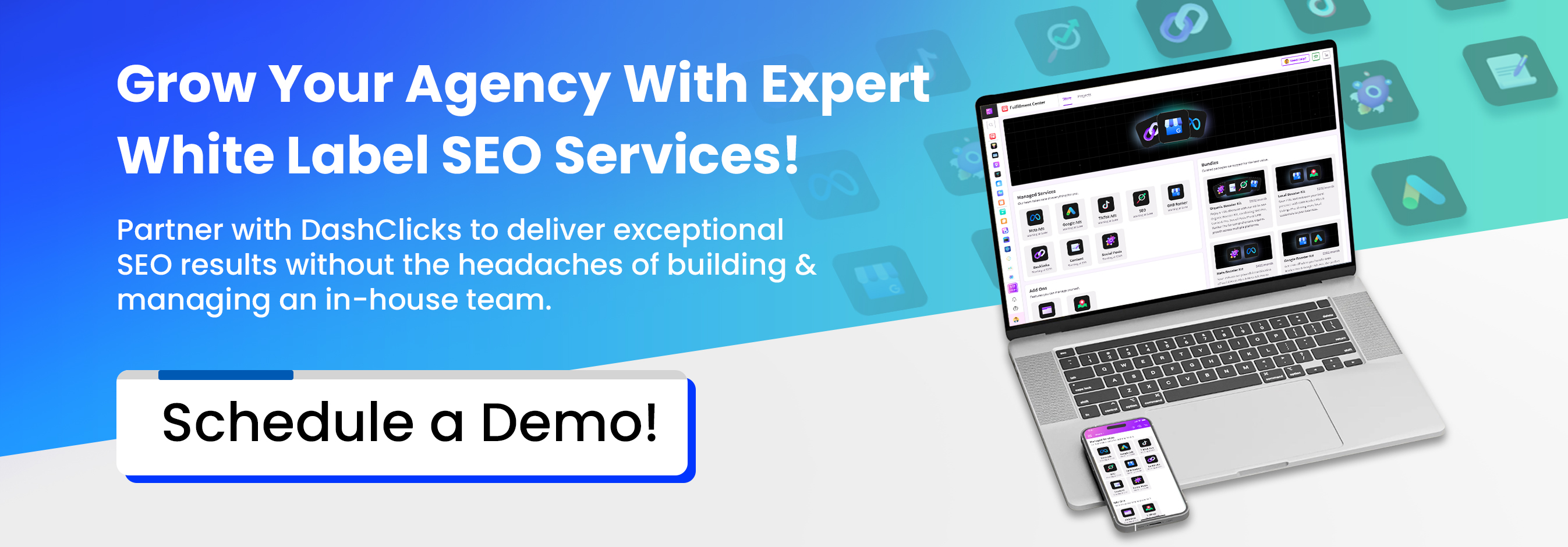

No results found.
Please try different keywords.
Get Started with
DashClicks Today
Get found online, convert leads faster, generate more revenue, and improve your reputation with our all-in-one platform.
.svg)
Unlimited Sub-Accounts
.svg)
Unlimited Users
.svg)
All Apps
.svg)
All Features
.svg)
White-Labeled
.svg)
Active Community
.svg)
Mobile App
.svg)
Live Support
.svg)
100+ Tutorials
.svg)
Unlimited Sub-Accounts
.svg)
Unlimited Users
.svg)
All Apps
.svg)
All Features
.svg)
White-Labeled
.svg)
Active Community
.svg)
Mobile App
.svg)
Live Support
.svg)
100+ Tutorials
.svg)
Unlimited Sub-Accounts
.svg)
Unlimited Users
.svg)
All Apps
.svg)
All Features
.svg)
White-Labeled
.svg)
Active Community
.svg)
Mobile App
.svg)
Live Support
.svg)
100+ Tutorials



.svg)
.svg)
.svg)
.svg)
.svg)


